近义词对比
- 格式:doc
- 大小:65.50 KB
- 文档页数:10
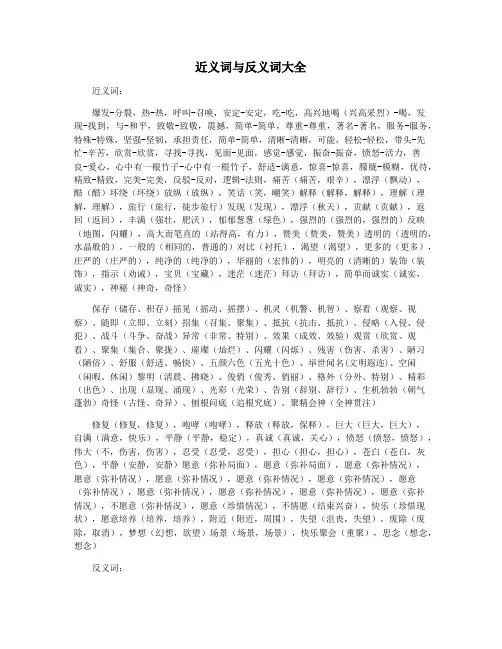
近义词与反义词大全近义词:爆发-分裂,热-热,呼叫-召唤,安定-安定,吃-吃,高兴地喝(兴高采烈)-喝,发现-找到,与-和平,致敬-致敬,震撼,简单-简单,尊重-尊重,著名-著名,服务-服务,特殊-特殊,坚强-坚韧,承担责任,简单-简单,清晰-清晰,可能,轻松-轻松,带头-先忙-辛苦,欣赏-欣赏,寻找-寻找,见面-见面,感觉-感觉,振奋-振奋,愤怒-活力,善良-爱心,心中有一根竹子-心中有一根竹子,舒适-满意,惊喜-惊喜,朦胧-模糊,优待,精致-精致,完美-完美,反驳-反对,逻辑-法则,痛苦(痛苦,艰辛),漂浮(飘动),酷(酷)环绕(环绕)放纵(放纵),笑话(笑,嘲笑)解释(解释,解释),理解(理解,理解),旅行(旅行,徒步旅行)发现(发现),漂浮(秋天),贡献(贡献),返回(返回),丰满(强壮,肥沃),郁郁葱葱(绿色),强烈的(强烈的,强烈的)反映(地图,闪耀),高大而笔直的(站得高,有力),赞美(赞美,赞美)透明的(透明的,水晶般的),一般的(相同的,普通的)对比(衬托),渴望(渴望),更多的(更多),庄严的(庄严的),纯净的(纯净的),华丽的(宏伟的),明亮的(清晰的)装饰(装饰),指示(劝诫),宝贝(宝藏),迷茫(迷茫)拜访(拜访),简单而诚实(诚实,诚实),神秘(神奇,奇怪)保存(储存、积存)摇晃(摇动、摇摆)、机灵(机警、机智)、察看(观察、视察)、随即(立即、立刻)招集(召集、聚集)、抵抗(抗击、抵抗)、侵略(入侵、侵犯)、战斗(斗争、奋战)异常(非常、特别)、效果(成效、效验)观赏(欣赏、观看)、聚集(集合、聚拢)、璀璨(灿烂)、闪耀(闪烁)、残害(伤害、杀害)、陋习(陋俗)、舒服(舒适、畅快)、五颜六色(五光十色)、举世闻名(文明遐迩)、空闲(闲暇、休闲)黎明(清晨、拂晓)、俊俏(俊秀、俏丽)、格外(分外、特别)、精彩(出色)、出现(显现、涌现)、光彩(光荣)、告别(辞别、辞行)、生机勃勃(朝气蓬勃)奇怪(古怪、奇异)、刨根问底(追根究底)、聚精会神(全神贯注)修复(修复,修复),咆哮(咆哮),释放(释放,保释),巨大(巨大,巨大),自满(满意,快乐),平静(平静,稳定),真诚(真诚,关心),愤怒(愤怒,愤怒),伟大(不,伤害,伤害),忍受(忍受,忍受),担心(担心,担心),苍白(苍白,灰色),平静(安静,安静)愿意(弥补局面),愿意(弥补局面),愿意(弥补情况),愿意(弥补情况),愿意(弥补情况),愿意(弥补情况),愿意(弥补情况),愿意(弥补情况),愿意(弥补情况),愿意(弥补情况),愿意(弥补情况),愿意(弥补情况),不愿意(弥补情况),愿意(珍惜情况),不情愿(结束兴奋),快乐(珍惜现状),愿意培养(培养,培养),附近(附近,周围),失望(沮丧,失望),废除(废除,取消),梦想(幻想,欲望)场景(场景,场景),快乐聚会(重聚),思念(想念,想念)反义词:理解(误解)、强(弱)整体(部分)、强(瘦)、奉献(奉献)、身份(差异)、完整(零)、美(丑)赞美(嘲笑)、燃烧(消光)、透明(浑浊)天堂(地狱)、美(粗)吸引(拒绝)、纯(浑浊)困惑(清醒)、可爱(可恨)、聪明(迟钝)、自满(沮丧)、简单诚实(狡猾),神秘(普通)保存(毁灭)、精疲力竭——充满活力、失败(成功)、信心(泄气)、招募(解散)、抵抗(投降)聚集(分散)、舒适(不适)、辉煌(低劣、粗糙)、举世闻名(未知)羞辱(荣誉、荣耀)、豁免(任命)异常(正常、普通),分析(综合)英俊(丑陋),紧张-放松,特别(一般,普通)的外表(消失,消失),光彩(羞耻,羞愧),像仇恨,告别(欢聚,团聚),活力(死亡)活泼(严肃,沉闷),甜蜜(苦涩),成熟(孩子气,孩子气),活泼(冷漠),奇怪(正常,普通),专注(心不在焉)修复(伤害),释放(逮捕、恢复、捕获)、自满(挫败、不满)正面朝上——头朝下、巨大(小、小)、平静(恐慌、恐慌)、真诚(虚伪、虚假)、忍受(冲动、抵抗)、担忧(放心)、苍白(红润)、平静(兴奋、吵闹)、不情愿(自愿)、愿意(不情愿)、犹豫(果断)、忧郁(高兴)、结束(开始)、困境(美好时光),轮流(固定),温暖(寒冷,寒冷)珍惜(破坏,浪费)失望(希望,期望),培养(破坏),软(硬),近(远),失望(享受,快乐),梦想(现实,现实),闲暇忙碌,快乐聚会(分离,分离),想念(忘记,忘记),兴高采烈(无精打采),清晰模糊的闲暇(紧张,忙碌),废除(总结,恢复),毁伤(保护,保卫)强弱痛苦(快乐,快乐),喜欢(仇恨),愤怒(快乐)冷静(闷热),快乐(痛苦)冷热,快乐-悲伤,宽大-狭窄,暑假-温暖,突出-谦逊,简单-奢侈,特殊-一般,兴奋-平静,轻蔑-注意,传统-现代,亲密-疏远,失望-期待,紧张-放松,悲伤的脸-微笑,粗壮-短暂的敏感-缓慢,失望-绝望,感激-感激,危险-安全,担忧-放心,朦胧-清晰,快乐-不舒服,廉价-昂贵。
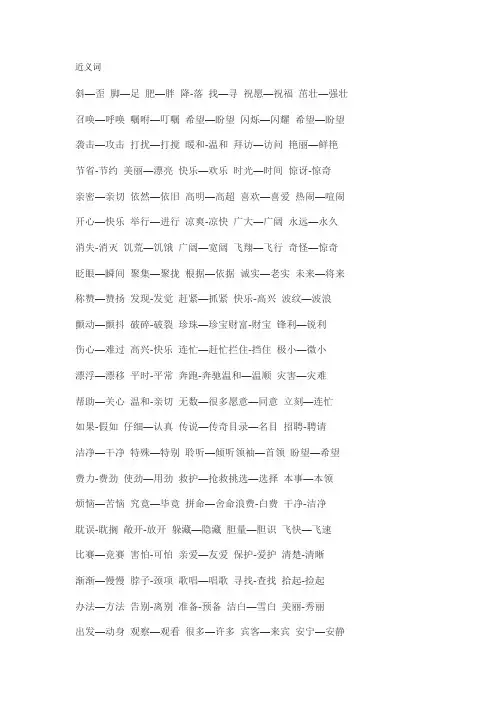
近义词斜—歪脚—足肥—胖降-落找—寻祝愿—祝福茁壮—强壮召唤—呼唤嘱咐—叮嘱希望—盼望闪烁—闪耀希望—盼望袭击—攻击打扰—打搅暖和-温和拜访—访问艳丽—鲜艳节省-节约美丽—漂亮快乐—欢乐时光—时间惊讶-惊奇亲密—亲切依然—依旧高明—高超喜欢—喜爱热闹—喧闹开心—快乐举行—进行凉爽-凉快广大—广阔永远—永久消失-消灭饥荒—饥饿广阔—宽阔飞翔—飞行奇怪—惊奇眨眼—瞬间聚集—聚拢根据—依据诚实—老实未来—将来称赞—赞扬发现-发觉赶紧—抓紧快乐-高兴波纹—波浪颤动—颤抖破碎-破裂珍珠—珍宝财富-财宝锋利—锐利伤心—难过高兴-快乐连忙—赶忙拦住-挡住极小—微小漂浮—漂移平时-平常奔跑-奔驰温和—温顺灾害—灾难帮助—关心温和-亲切无数—很多愿意—同意立刻—连忙如果-假如仔细—认真传说—传奇目录—名目招聘-聘请洁净—干净特殊—特别聆听—倾听领袖—首领盼望—希望费力-费劲使劲—用劲救护—抢救挑选—选择本事—本领烦恼—苦恼究竟—毕竟拼命—舍命浪费-白费干净-洁净耽误-耽搁敞开-放开躲藏—隐藏胆量—胆识飞快—飞速比赛—竞赛害怕-可怕亲爱—友爱保护-爱护清楚-清晰渐渐—慢慢脖子-颈项歌唱—唱歌寻找-查找拾起-捡起办法—方法告别-离别准备-预备洁白—雪白美丽-秀丽出发—动身观察—观看很多—许多宾客—来宾安宁—安静逃窜-逃跑突然—忽然热闹—吵闹流动-流淌连忙—赶忙忽然-突然好似-好像连忙—急忙正要—刚要浮上-浮现辽阔—宽阔昂首-仰头眼力—视力故乡—家乡本事—本领劝告—劝说依赖-依靠凭着—靠着机灵-机智奔走—奔跑秘密—隐秘专心—用心著名—闻名奇怪—惊奇发现—发明好象-仿佛愤怒-气愤坚定-坚决仍旧-照旧录取—录用聊天—谈天盼望-希望培养—培育弯弯曲曲—曲曲折折连绵不断-连绵起伏赞不绝口—赞叹不已心惊肉跳—胆战心惊丝毫未动-纹丝不动眉开眼笑-喜笑颜开爱慕—喜爱安然—安稳奥秘—神秘懊悔—后悔报酬—酬劳悲哀—悲伤崩塌—倒塌必然—必定避免-幸免便宜—廉价哺育—培育猜测—推测才干—才能采用—采纳颤动—抖动沉浸—沉醉惩罚—惩处迟延—拖延耻笑—讥笑炽热—酷热憧憬—向往酬谢—答谢啜泣—抽泣创造—制造绰号-外号慈悲-慈善慈祥—慈爱葱茏—葱郁聪明—聪慧催促—督促璀璨-明亮打扮—装扮打搅—打扰胆怯—害怕淡忘—忘却调皮—淘气叮嘱-嘱咐妒忌-嫉妒对付—应付对照—对比恩赐-赏赐发布-公布发誓—宣誓发展-进展繁殖—生殖反抗—抵抗防御—防备妨碍-阻碍分量-重量分外—格外愤怒—愤慨锋利—锐利服侍—侍侯浮现-出现赋予—给予告别-告辞恭敬—尊敬估计—估量鼓励—鼓舞固然-当然故意—有意关心—关怀管理—治理贯通—贯穿瑰宝-珍宝含糊-模糊寒冷—严寒和蔼—和气宏伟-雄伟欢跃—喜悦环绕—围绕荒芜—荒凉回顾-回忆汇集—汇合获取-猎取祸患—祸害机灵—灵巧积累—积存即将—马上疾驰—飞奔寄托—寄予讥笑—嘲笑坚固—牢固坚毅—坚强艰苦-艰难艰难-困难建造—建筑交织—交错娇嫩—柔嫩节制-克制竭力—尽力解救—拯救谨防-防备谨慎—慎重惊险—危险精密-周密精致-精巧敬仰—仰慕境界—境地居然—竟然开辟—开发慷慨—大方可惜-惋惜空暇—空闲恐怖—恐惧控制—操纵款待—招待愧疚—内疚劳苦—劳累黎明—拂晓立即—马上灵便—灵活领略-领会浏览—扫瞄隆重-盛大沦陷—沦落罗列—排列满意—中意漫步—闲逛茂密-茂盛朦胧—模糊弥漫—布满密切—紧密勉励—鼓励勉强—牵强藐视—轻视泯灭—消灭明丽-明媚蓦地—突然模范-榜样鸟瞰-俯视凝结—凝聚凝视-注视挪移—移动偶尔—间或判断—推断批评—批判疲惫—疲乏疲倦—疲乏僻静—偏僻漂亮—美丽飘荡—漂浮飘拂—漂动品格-品行平生—终生平庸—平凡平整-平坦普通—一般欺凌—凌辱奇妙-奇异歧视—卑视气魄—气势气势—气概启示—启发清晰-清楚乾坤-天地潜伏—埋伏谴责-责备惬意-满意亲密—亲热轻蔑—轻视轻盈—轻快清纯-纯洁清晰—清楚驱赶—驱逐弱小—微小伤害—损害商议—商量商议-协商稍微—略微奢靡—奢侈神秘—神奇神奇—奇妙神奇—奇特审阅—批阅实用—有用舒畅—舒服思量—思考伺侯—侍奉肃静-安静素质—素养率先—领先贪婪—贪欲探索—探究逃避—躲避特殊-特别誊写—抄写体面—风光体味-体会推荐—推举妥帖—稳妥蜿蜒-曲折顽强—坚韧顽强—顽固宛然—仿佛宛如-犹如宛若—仿佛宛若-宛如巍峨—雄伟惟独—只有危急-危险尾随—跟随委托—托付温和-和气温和—温柔吸收-汲取希翼—希望稀罕—希奇袭击—突击吓唬—恐吓鲜明—鲜亮羡慕-艳羡向来-一直消失-消逝歇息-休息欣赏—观赏新鲜—新奇兴旺—兴盛兴许-或许凶猛—凶狠雄伟—宏伟修筑-修建羞愧—惭愧秀媚—秀丽徐徐—缓缓寻常-平常寻觅—寻找延续—连续严重-严峻遥望—眺望要挟—挟制依然—依旧游览—巡游黝黑—乌黑幼稚—稚嫩预计—估计愿意—情愿允许—同意暂时—临时阻挠—阻止赞赏—欣赏赞叹—赞美责怪—责备占领—占据照射—照耀照应—照顾珍贵-宝贵镇静-冷静征服—制服拯救—挽救争执—争吵指望—盼望骤然—突然注视—凝视追寻—寻找捉弄-戏弄茁壮-健壮滋味—味道纵情—尽情阻塞—堵塞恰好-刚好俏丽—美丽厌恶—讨厌镇静-镇定顽强-坚强猜测—推测稀薄-淡薄争论—争辩妥善-妥当潜伏—埋伏显然—明显迷糊—模糊蔓延—扩散舒展—展开驱逐—驱走误解—误会迫害—破坏赞赏—赞扬迷恋—沉迷祸患—灾祸骤然-忽然广阔—辽阔指望—希望照应—照顾疲倦—困倦恳求—请求朴素—俭朴处罚—惩罚妨碍—阻碍明了—明白风险-危险鼓励—鼓舞慰藉—安慰新鲜—新奇出生-诞生洪亮—嘹亮抵御—抵挡神秘—神奇主人—仆人渴望—盼望奇妙—美妙寂静—安静即将—马上清晨—早晨珍贵—贵重慈悲—仁慈茂密—茂盛继续—陆续艳丽—明丽倘若-假如逼近—靠近彻低—完全精致—精美瞭望—眺望贡献—奉献矫健—强健果然—果真谦虚—谦逊迷蒙—迷漫证实-证明联系—联络悦耳—动听隐蔽—隐藏寻常—平常惬意—满意惊讶—-吃惊朦胧—-模糊优惠-—优待精巧—-精致完美——完善逻辑-—规律兴许——也许轻巧-—轻松率先-—首先忙碌——劳碌欣赏-—赏识寻觅——寻找会晤—-会见感触——感受振奋——振作生气—-生机慈祥——慈爱五光十色—-五彩缤纷连绵不断-—连续不断若隐若现—-时隐时现别具一格-—独具匠心不可计数——不计其数风俗世情———风土人情毫不犹豫——坚决果断绞尽脑汁—-费尽心机筋疲力尽——-力倦神疲迥乎不同—-绝然不同举世闻名——闻名遐迩聚精会神——全神贯注雷霆万钧——排山倒海络绎不绝——川流不息眉开眼笑——眉飞色舞目不转睛—-聚精会神排山倒海-—移山倒海疲惫不堪——-筋疲力竭千磨万击——千锤百炼情不自禁—-不由自主盛气凌人——不可一世随心所欲——为所欲为同心协力-——同心同德无拘无束—-自由自在喜不自胜—-乐不可支腥风血雨——凄风苦雨一五一十-—如数家珍依依不舍——恋恋不舍应有尽有——无奇不有朝夕与共-—朝夕相处震耳欲聋—-响彻云霄成竹在胸——胸有成竹反义词胖—瘦香—臭明-暗忙-闲凉—暖来—去尖—钝好-坏轻—重前—后左—右是—非有—无老—少深—浅高—低快—慢升—降入—出开—关斜—正落—升冷—热饿-饱贫—富死—活穷-富买-卖旧—新细—粗明—暗首-尾始—终暖—寒缓-急宽—窄甘-苦外—内先—后卖—买闲-忙俯—仰浮—沉饱—饥寒—暖隐—现明-暗此-彼朝—暮紧-松伸—缩洁白—漆黑美丽-丑陋仔细-马虎告别—会合舒服-难受粗心—细心出发—归来安宁-喧闹宽敞-狭窄困难—容易热闹—寂静空闲—忙碌打开-关闭流动—固定暖和—寒冷弯曲—笔直微笑—悲伤昂首-低头开始—结束现在—将来喜欢—讨厌欢快—沉重机灵—愚笨明白-糊涂希望—失望傍晚—清晨秘密—公开高大—矮小坚定-动摇张开-合拢经常—偶尔愤怒-高兴坚定—犹豫清楚—模糊熟悉—陌生保护—破坏勇敢—懦弱聪明—愚蠢失败—成功敞开—关闭飞快—缓慢明白—糊涂失败-成功烦恼—高兴特殊—一般特别—普通漂亮—丑陋高兴-伤心仔细—粗心精彩—枯燥洁净-肮脏飞快—缓慢极小-极大温和—暴躁坚固—松散凝结—离散陡峭—平坦伟大—渺小温顺—凶猛沸腾—沉寂壮丽—晦暗呈现—消失静寂—嘈杂便宜—昂贵迟钝—敏捷兴奋—忧愁美丽—丑陋天堂—地狱弯曲—笔直懒惰—勤快宽裕—拮据隐藏—公开平坦—坎坷柔弱—坚强干燥-潮湿古老-现代故人—新交蜿蜒—笔直凝结-溶解增长—减短崭新—陈旧安静—吵闹简单—复杂勇猛—怯懦附近—遥远寒冷-温暖温柔—凶恶尽职—失职轻盈—笨重微波—巨浪聚集—分散明亮—暗淡蜿蜒—笔直善良-凶恶马虎-认真生疏—熟练卓越—-平凡伟大—渺小朴实—华丽安全—危险冷淡—热情犹豫-果断松散—紧凑减产—增产下降—上升破坏-保护容易——困难灵巧——笨拙敏锐-迟钝立刻—迟缓宽敞—狭窄平衡—倾斜提高-降低沉寂—喧闹黝黑-白皙和平—战争顺畅-阻塞坚强-柔弱遵从—违反骄傲—谦虚完整—残缺坚硬—柔软糟蹋—爱惜有限—无限失望—希望清晰—模糊温暖-寒冷明白—疑惑朴素—华丽公开—保密独特—普通微弱-强烈漆黑-明亮消失-出现责备-表扬固执-随和特别—一般细致—粗糙舒服-难受疑惑-明白坚定—动摇容易—困难成功—失败违抗—遵从纯洁—污浊错误—正确坚定-动摇凶恶-善良违背-遵从明白—糊涂偶尔—经常俊俏-丑陋乌黑—洁白光滑—粗糙轻快-沉重静止-移动躲藏—暴露漆黑—光明清闲—忙碌自在—拘束枯萎—茂盛依赖—独立从容-慌张粗俗—文雅承认—否认疲倦—充沛漂亮—丑陋违抗—服从陌生-熟悉难过-高兴骄傲—谦虚紧张—放松真理-谬论强壮-瘦弱沉醉—苏醒清凉—闷热仰望—俯视平坦—陡峭善良-凶恶片刻—长久贫瘠-肥沃强大-弱小遭殃-幸运温柔-粗暴敏感-迟钝好事—坏事奔跑-停止灾害—幸福坚硬—松软堵塞—畅通昂贵-便宜锋利—迟钝聚集—分散新鲜—陈旧破碎—完整未来—现在诚实—狡猾可爱—可恨活泼—呆板赶紧—拖延凉爽—炎热永远-短暂广阔—狭小相信—怀疑裂开—合拢相信—怀疑节省-浪费亲密—疏远高明—低劣热闹-冷清喜欢-讨厌茁壮—虚弱批评-表扬倔强—温顺明白—糊涂镇定—惊慌稀少—稠密狭窄—宽阔慌忙—从容方便—麻烦便宜—昂贵昏暗-明亮维护—破坏损失-受益干燥—湿润精通-生疏温暖—寒冷痛苦—快乐故意—无意防御-进攻黑暗-光明悦耳—刺耳伤害—保护发展—落后拥有—失去吝啬-大方幼稚-成熟含糊-清楚茂密-稀疏灿烂-黯淡团结-分裂兴旺-衰败特殊-普通歧视-重视杰出-平庸恶劣-良好显赫-卑微迟延-提前惩罚-奖励魁梧-矮小增添-减少朴素-奢侈蔑视-尊重诚意-假意拒绝-接受示弱-逞强好心-恶意破碎-完整酥软-坚硬炎热-寒冷仔细-马虎聪明-愚蠢空虚-充实伶俐-笨拙诚实-说谎狭窄-宽阔晦暗-明亮勇敢-懦弱宽容-狭隘简陋-豪华异常-平常魁梧-瘦弱精致-粗糙幸福-痛苦穷苦-富裕忧虑-放心蜷缩-伸直潮湿-干燥统一-分裂紧张-松弛危险-安全繁荣-衰败淘气-老实大概-精确坚定-动摇忧伤-快乐漆黑-明亮节省-浪费寒冷-炎热悲伤-愉快持续-中断吃力-轻松凉爽-温暖消失-显现险峻-平缓茂盛-枯萎美丽-丑陋暴躁-温顺腼腆-大方减少-增加严重-轻微熟悉-陌生骄傲-谦虚懦弱-坚强平静-动荡外表-内心弯曲-笔直牢固-松散超常-失常沮丧-兴奋保护-破坏新鲜-腐烂集中-分散粗糙-光滑藏匿-公开郑重-随意高昂-低落自在-拘束扩大-缩小柔和-严厉刚强-软弱出现-消失衰老-年轻淡雅-浓艳清醒-糊涂熟识-生疏伶俐-笨拙害羞-大方倾斜-竖直复杂-简单肯定-否定团结-分裂洒脱-拘谨明朗-阴沉残破-完整簇拥-分散陡峭-平缓热烈-平静沉着-惊慌坚强-脆弱崎岖-平坦严寒-酷暑慌忙-镇定朴素-华丽健美-衰弱拘束-随便老实-狡猾个性-共性深奥-浅显详细-简略贫瘠-肥沃敬佩-鄙视迅速-缓慢耐心-急躁扩散-集中综合-分解密切-疏远洪亮-低沉嘲笑-称赞重逢-离别偶尔-经常稀罕-平常寻常-特殊迅猛-缓慢慷慨-吝啬存在-消失浏览-精读冲锋-退却揳入-退出隐蔽-暴露精彩-糟糕放肆-谨慎及时-耽误快活-忧伤厄运-好运指望-失望平庸-优秀允许-禁止机灵-笨拙俊俏-丑陋漂浮-沉没精细-粗糙辽阔-狭小关切-冷落真理-谬误绽放-凋谢开放-封闭疑惑-坚信强盛-衰弱尊重-侮辱失信-守信坚强-软弱掩盖-揭露发掘-埋没承受-推却推测-断定镇定-紧张严寒-酷暑笨重-轻盈严肃-活泼挺进-撤退湍急-平缓抑制-张扬危险-安全生气勃勃—死气沉沉雪中送炭-雪上加霜歪歪斜斜-端端正正马马虎虎-认认真真漫不经心-全神贯注心平气和-暴跳如雷筋疲力尽-精神抖擞人声鼎沸-鸦雀无声垂头丧气-兴高采烈人山人海-寥寥无几愁眉紧锁-喜笑颜开不计其数-屈指可数得意洋洋—垂头丧气变化莫测-一成不变荒无人烟-人烟稠密震耳欲聋-鸦雀无声前赴后继-畏缩不前隐隐约约—清清楚楚歪歪斜斜-端端正正枝繁叶茂-枯枝败叶垂头丧气-昂首挺胸迷惑不解-恍然大悟毫不犹豫-犹豫不决理直气壮-理屈词穷心惊肉跳-镇定自若一丝不苟-马马虎虎盛气凌人-平易近人万古长青-昙花一现断断续续-连续不断目瞪口呆-谈笑自若力倦神疲-精力充沛熙熙攘攘-冷冷清清漫不经心-专心致志垂头丧气-扬眉吐气人声鼎沸—鸦雀无声完整无缺-支离破碎隐隐约约-清清楚楚名副其实-名不副实宽阔――狭窄平静――动荡风平浪静-风号浪吼涨-降隐—现人声鼎沸――鸦雀无声加重――减轻缓慢――快速节省――浪费分散――聚拢茂盛—枯萎美丽—丑陋静寂—热闹清楚—模糊镇静—慌乱伸开—缩拢威武—沮丧笑盈盈—哭啼啼恍恍惚惚—清清楚楚一模一样—截然不同巨大—细小神秘—平常原始—现代寒冷—炎热珍贵—普通深-浅窄—宽远――近高――低冷――热横――竖同-异浑-清丰年—歉年柳暗花明-山穷水尽舒服――难受弯曲――笔直紧――松均匀――悬殊牢固――脆弱新鲜――陈腐明――暗反面――正面伸出――缩回细――粗嫩――老干燥――潮湿平坦――崎岖简单――复杂粗糙――细腻幸福――悲惨谦虚――骄傲快乐――伤心宽阔――狭窄强健――软弱清澈――浑浊勤勤恳恳――懒懒散散明白――糊涂茂密――稀疏成功――失败寒冷――温暖愤怒――高兴灵活――笨拙准许――拒绝热情――冷淡勤劳――懒惰分散—聚集迅速—迟钝认真—马虎失败—胜利犹豫—果断坚定—动摇膨大—缩小迟钝—灵活笨重-轻便临时――长期慎重――马虎柔弱――刚强干燥――湿润光滑――粗糙静谧――热闹凹――凸崭新――陈旧开始――结尾漂亮――丑陋喧闹――宁静容易――困难凋谢――盛开温暖――寒冷朋友――敌人山谷――山峰点燃――熄灭神奇――平常笑嘻嘻――哭兮兮热闹――安静拽住――放开关心――冷漠高傲――谦逊郑重――轻率从容――慌张一丝不苟――敷衍了事奢侈――寒酸敏捷――迟缓公――母合上――打开浮――沉从容――慌张老实――狡猾温柔――粗暴丰富――贫乏高兴――难过淘气――规矩讨厌――喜欢反抗――顺从忠厚――奸诈温暖――寒冷蜿蜒――笔直坚固――脆弱清楚――模糊陡峭――平坦伟大――渺小美丽――丑陋相同――不同古老――现代隐隐约约――清清楚楚享誉世界――默默无闻宏大――微小魁梧――矮小丰满――干瘪故人――新朋朝――暮轻――重无名――有名凉――暖懒惰――勤劳满意――失望相背而行――相向而行灿烂――暗淡凋零――盛开容易――困难希望――失望安全――危险可怜――可恨庄重――轻浮热情――冷淡坚强――懦弱恍然大悟――百思不解宽裕――拮据神气――颓丧喜悦――忧伤快乐――悲伤繁华――萧条热闹――宁静;褴褛――华丽踊跃――消极清晰――模糊仔细――粗心具体――大略温柔――粗暴危险――安全匆匆――慢慢筋疲力尽――精神抖擞认识――陌生疏远――亲近聪明――愚蠢长处――短处现代――古代依赖――自立美好――丑陋舒适――艰苦输入――输出陌生――熟悉打开――关闭凶猛――温和笨重――轻巧迟钝――灵敏相似――相反特殊――一般美妙――蹩脚优良――低劣勤劳――懒惰大-—小多——少上——下左——右前——后冷——热高——低进-—退黑——白天——地男-—女里—-外死——活公——私快—-慢矛——盾宽—-窄强——弱轻——重缓——急松—-紧好——坏美-—丑善-—恶是-—非闲——忙来——去分——合存——亡动——静浓—-淡偏——正饥-—饱爱——恨升--降开—-关始—-终胖-—瘦迎—-送盈——亏真——假虚--实有-—无雅-—俗是——否稀—-密粗——细东——西巧—-拙恩-—怨新——旧正——邪通—-堵止——行古-—今张—-弛曲——直亮——暗亲——疏收——放输——赢逆-—顺苦-—甜忠——奸纵——横得-—失南—-北薄——厚哭——笑文——武推—-拉问—-答主——仆买——卖深-—浅聚——散干——湿彼——此生—-熟单——双首——末你——我敌——友警——匪盛—-衰胜——败加——减软——硬阴——阳顺——逆反——正祸-—福信——疑错——对藏-—露老——少断——续钝-—锐浓——淡雌—-雄醒——睡止——行咸——淡正-—歪名副其实——名不副实雪中送炭—-雪上加霜歪歪斜斜——端端正正风平浪静--狂风恶浪迷迷糊糊-—清清楚楚全神贯注—-心不在焉断断续续-—连续不断赏心悦目——触目惊心一丝不苟——粗心大意力倦神疲——精力充沛万马奔腾——无声无息暖暖和和——冷冷清清吞吞吐吐——干干脆脆毫不犹豫——犹豫不决别具一格--普普通通熙熙攘攘—-冷冷清清心惊肉跳--镇定自如理直气壮——理屈词穷一朝一夕——日久天长悔过自新——执迷不悟群策群力-—孤掌难鸣废寝忘食——饱食终日沸沸扬扬——鸦雀无声翻来覆去——简单明了吵吵嚷嚷——冷冷清清唇枪舌剑——心平气和粗制滥造—-精雕细刻安居乐业—-颠沛流离正常—-异常非凡-—平凡特别—-一般扫兴——高兴轻蔑—-敬重开心—-苦闷寻常——异常违背——遵循怀疑——相信强盛-—衰败尊重--侮辱激烈—-平静嘈杂--寂静美丽-—丑陋信奉——背弃失信——守信率领——追随退化——进化凝结——溶解伟大——渺小聚拢——分散增添-—减少活泼-—呆板鲜艳——暗淡严寒——酷暑安谧——嘈杂温暖--凉爽柔和——严厉拒绝-—同意清醒-—糊涂荒芜-—耕种清晰——浑浊坚强——软弱微云——浓云纯熟—-生疏陌生-—熟悉平坦-—崎岖光滑—-粗糙慎重——随便喜欢——厌恶痛快—-难受幽静——喧闹崎岖——平坦刚强——软弱慌忙--镇定熟识—-生疏伶俐-—笨拙怕羞-—大方镇定-—慌张团结——分裂羞涩——大方严寒—-炎热洒脱——拘谨明朗-—阴沉沉重--轻盈迂回-—径直清澈--浑浊脆弱-—坚强饱满——干瘪衰弱-—强健犹豫--坚定丰收—-歉收复杂-—简单淡妆——浓抹相宜——不宜自在--拘束平常—-奇特勤劳——懒惰喜欢——讨厌密集——稀疏胜利—-失败挺进——撤退宽敞——狭窄倾斜——竖直闻名——无名认识—-陌生有趣——乏味舒畅——苦闷结束——开始紧张——轻松整齐——纷乱安全—-危险撒谎——诚实慈祥-—凶恶可爱-—可恶紧张——轻松仔细-—粗心附近——远方赞许-—反对淡水-—咸水高兴-—难过飞快——缓慢精彩--平淡笨重——轻便紧张——松弛有趣——乏味听从—-违抗诚实-—虚伪承认—-否认高兴—-伤心起劲—-没劲简单—-复杂容易-—困难熟练——生疏准确—-错误温和——严厉暴躁——温和近处—-远处气愤——欢喜粗心—-细心美丽-—丑陋洁白—-乌黑高兴——痛苦宽阔--狭窄崭新——陈旧兴旺——衰败团结-—分裂敏捷——迟钝危险-—安全常常——偶尔幼稚-—老练含糊——清楚严重—-轻微茂密——稀疏光明-—黑暗微弱——强大杰出——平庸恶劣——良好灿烂—-暗淡特殊——普通异常——平常简陋——豪华诚意——假意理屈—-理直拒绝——接受惩罚——奖励迟延-—提前示弱——逞强好心--恶意破碎——完整酥软-—坚硬炎热-—寒冷诚实——撒谎仔细——马虎聪明—-愚笨空虚——充实伶俐——笨拙狭窄-—宽阔晦暗—-明亮勇敢-—懦弱宽容——严格表扬——批评一向——偶尔善良——凶恶寂静——热闹聪明——愚笨穷苦-—富裕精致——粗糙健康--虚弱忧虑-—放心糟糕——精彩潮湿——干燥喜欢—-讨厌危险——安全寂寞——喧闹奴隶—-主人紧张-—松弛统一-—分裂繁荣——衰败精致—-粗糙权利-—义务黑—雪白俊俏—丑陋轻快—沉重鲜艳—暗淡增添—削减活泼—呆板聚拢—分散停止-开始玲珑—粗笨灵活—呆板陡峭—平坦特殊—一般送行—迎接舒适—难受悲惨—幸福愈合—开裂有名—无名离开—回归害怕—勇敢忧伤—高兴飞快—缓慢成功—失败镇定——慌张严寒——温暖恶劣-优良湿润——干燥端端正正——歪歪斜斜激烈——平静狼狈——潇洒英勇——怯懦危险——安全担心——放心朦胧—-清楚高兴—-难受便宜——昂贵喜欢-—讨厌筋疲力尽——干劲十足魁梧-—矮小敏锐—迟钝失望——期望紧张——松懈面露愁容—-面带微笑。
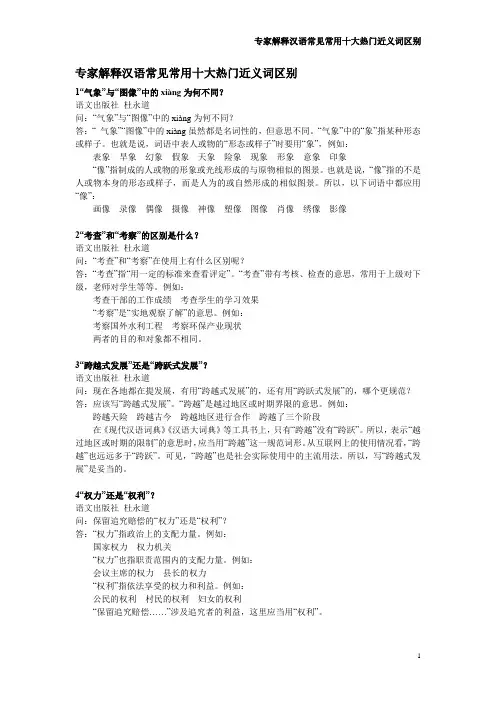
专家解释汉语常见常用十大热门近义词区别1“气象”与“图像”中的xiàng为何不同?语文出版社杜永道问:“气象”与“图像”中的xiàng为何不同?答:“ 气象”“图像”中的xiàng虽然都是名词性的,但意思不同。
“气象”中的“象”指某种形态或样子。
也就是说,词语中表人或物的“形态或样子”时要用“象”,例如:表象旱象幻象假象天象险象现象形象意象印象“像”指制成的人或物的形象或光线形成的与原物相似的图景。
也就是说,“像”指的不是人或物本身的形态或样子,而是人为的或自然形成的相似图景。
所以,以下词语中都应用“像”:画像录像偶像摄像神像塑像图像肖像绣像影像2“考查”和“考察”的区别是什么?语文出版社杜永道问:“考查”和“考察”在使用上有什么区别呢?答:“考查”指“用一定的标准来查看评定”。
“考查”带有考核、检查的意思,常用于上级对下级,老师对学生等等。
例如:考查干部的工作成绩考查学生的学习效果“考察”是“实地观察了解”的意思。
例如:考察国外水利工程考察环保产业现状两者的目的和对象都不相同。
3“跨越式发展”还是“跨跃式发展”?语文出版社杜永道问:现在各地都在提发展,有用“跨越式发展”的,还有用“跨跃式发展”的,哪个更规范?答:应该写“跨越式发展”。
“跨越”是越过地区或时期界限的意思。
例如:跨越天险跨越古今跨越地区进行合作跨越了三个阶段在《现代汉语词典》《汉语大词典》等工具书上,只有“跨越”没有“跨跃”。
所以,表示“越过地区或时期的限制”的意思时,应当用“跨越”这一规范词形。
从互联网上的使用情况看,“跨越”也远远多于“跨跃”。
可见,“跨越”也是社会实际使用中的主流用法。
所以,写“跨越式发展”是妥当的。
4“权力”还是“权利”?语文出版社杜永道问:保留追究赔偿的“权力”还是“权利”?答:“权力”指政治上的支配力量。
例如:国家权力权力机关“权力”也指职责范围内的支配力量。
例如:会议主席的权力县长的权力“权利”指依法享受的权力和利益。
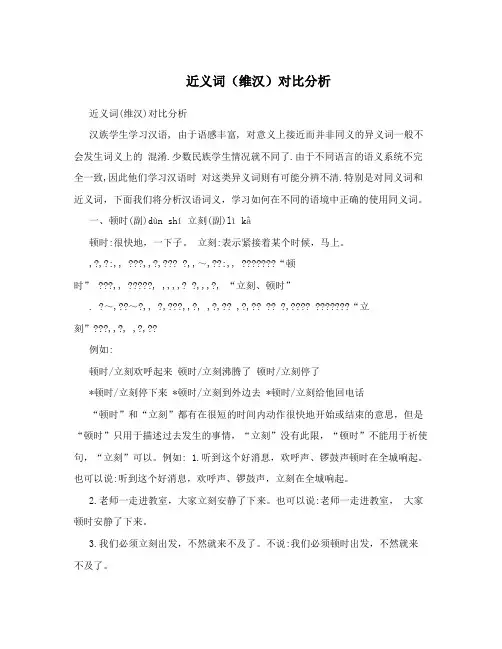
近义词(维汉)对比分析近义词(维汉)对比分析汉族学生学习汉语, 由于语感丰富, 对意义上接近而并非同义的异义词一般不会发生词义上的混淆.少数民族学生情况就不同了.由于不同语言的语义系统不完全一致,因此他们学习汉语时对这类异义词则有可能分辨不清.特别是对同义词和近义词,下面我们将分析汉语词义,学习如何在不同的语境中正确的使用同义词。
一、顿时(副)dùn shí 立刻(副)lì kâ顿时:很快地,一下子。
立刻:表示紧接着某个时候,马上。
,?,?:,, ???,,?,??? ?,,~,??:,, ???????“顿时” ???,, ?????, ,,,,? ?,,,?, “立刻、顿时”. ?~,??~?,, ?,???,,?, ,?,?? ,?,?? ?? ?,???? ???????“立刻”???,,?, ,?,??例如:顿时/立刻欢呼起来顿时/立刻沸腾了顿时/立刻停了*顿时/立刻停下来 *顿时/立刻到外边去 *顿时/立刻给他回电话“顿时”和“立刻”都有在很短的时间内动作很快地开始或结束的意思,但是“顿时”只用于描述过去发生的事情,“立刻”没有此限,“顿时”不能用于祈使句,“立刻”可以。
例如: 1.听到这个好消息,欢呼声、锣鼓声顿时在全城响起。
也可以说:听到这个好消息,欢呼声、锣鼓声,立刻在全城响起。
2.老师一走进教室,大家立刻安静了下来。
也可以说:老师一走进教室,大家顿时安静了下来。
3.我们必须立刻出发,不然就来不及了。
不说:我们必须顿时出发,不然就来不及了。
二、连忙(副)lián mánɡ 急忙(形)jí mánɡ连忙:立即;马上。
急忙:因为着急而行动加快。
?,,,??-,,,?? ?,?,???? ???????“连忙”? ???,, ?????, ,,,,? ?,,,?, “连忙、急忙”?,,,??-,,,?? ?,?:,~??? ?,??,, ,,???:,~???“急忙”???,,?, ,?,?? ???,,-??:,~???.?~,??~?,, ?,???,,?, ,?,?? ??:,~??,-??:,~??? ????,,-??:,~???急忙/连忙站起来急忙/连忙起床急忙/连忙做饭急忙/连忙打开电视急忙/连忙去上课“连忙”是副词,用在第二个分句作状语,意思是立刻,马上。
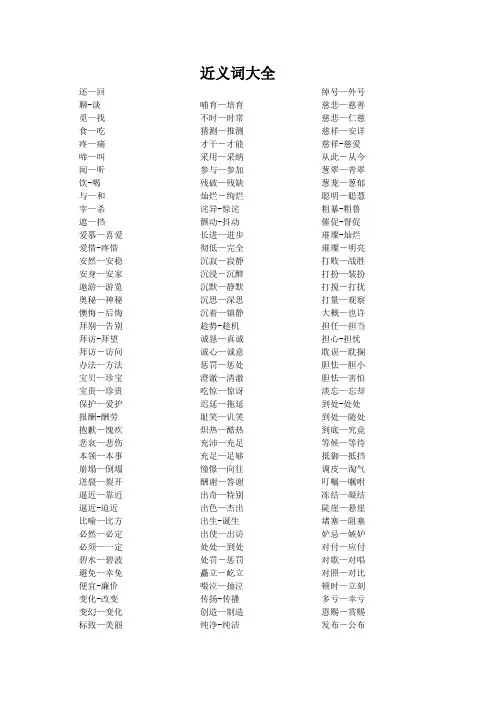
还—回聊-谈觅—找食—吃疼—痛啼—叫闻—听饮-喝与—和宰—杀遮—挡爱慕—喜爱爱惜-疼惜安然—安稳安身—安家遨游—游览奥秘—神秘懊悔-后悔拜别—告别拜访-拜望拜访-访问办法—方法宝贝—珍宝宝贵—珍贵保护—爱护报酬-酬劳抱歉-愧疚悲哀—悲伤本领—本事崩塌—倒塌迸裂—裂开逼近—靠近逼近-迫近比喻—比方必然—必定必须—一定碧水—碧波避免—幸免便宜-廉价变化-改变变幻—变化标致—美丽近义词大全哺育—培育不时—时常猜测—推测才干-才能采用—采纳参与—参加残破—残缺灿烂-绚烂诧异-惊诧颤动-抖动长进—进步彻低—完全沉寂—寂静沉浸-沉醉沉默—静默沉思—深思沉着—镇静趁势-趁机诚恳—真诚诚心—诚意惩罚—惩处澄澈—清澈吃惊—惊讶迟延—拖延耻笑—讥笑炽热—酷热充沛—充足充足—足够憧憬—向往酬谢—答谢出奇—特别出色—杰出出生-诞生出使—出访处处—到处处罚-惩罚矗立-屹立啜泣—抽泣传扬-传播创造—制造纯净-纯洁绰号—外号慈悲—慈善慈悲—仁慈慈祥—安详慈祥-慈爱从此-从今葱翠—青翠葱茏—葱郁聪明—聪慧粗暴-粗鲁催促-督促璀璨-灿烂璀璨-明亮打败—战胜打扮—装扮打搅-打扰打量—观察大概—也许担任—担当担心-担忧耽误—耽搁胆怯—胆小胆怯—害怕淡忘—忘却到处-处处到处—随处到底—究竟等候—等待抵御—抵挡调皮—淘气叮嘱—嘱咐冻结—凝结陡崖—悬崖堵塞—阻塞妒忌—嫉妒对付—应付对歌—对唱对照—对比顿时—立刻多亏—幸亏恩赐-赏赐发布-公布发抖-颤抖发射—放射发誓-宣誓发现—发觉发展—进展烦恼—苦恼繁殖-生殖反驳—反对反抗—抵抗方便—便利防御—防备妨碍—阻碍仿佛—好像费力-费劲分量—重量分配—安排分外—格外吩咐—嘱咐愤怒-愤慨风险—危险封锁-封闭锋利—锐利奉献-贡献服侍-侍侯浮现—出现抚弄—抚摸附近-周边复仇-报仇赋予-给予感触-感受感激—感谢刚强—坚强高超-超群告别—告辞告别—离别公平—公正恭敬—尊敬贡献-奉献勾勒—勾画估计—估量鼓励—鼓舞固然—当然故意—有意挂念-想念关心—关怀管理—治理贯通-贯穿光彩—光荣广阔—辽阔规矩-规则规则—规章瑰宝-珍宝国势—国力果然—果真含糊—模糊寒冷-严寒好奇-奇怪好像—犹如和蔼—和气轰出—赶出宏伟—雄伟洪亮—嘹亮呼唤-召唤呼啸—咆哮忽然—突然互相—相互哗笑-哄笑欢聚—团聚欢腾—欢跃欢喜—高兴欢跃—喜悦环绕—围绕环视-环顾缓缓—缓慢荒芜—荒凉慌忙—慌张回顾—回忆回归-回来汇集—汇合会晤—会见昏暗—阴暗获取—猎取祸患-祸害祸患—灾祸讥笑-嘲笑机灵—灵巧积累-积存激昂-激扬及时-准时吉祥—吉利汲取—吸取即将—马上疾驰-奔驰疾驰—飞奔疾驰-迅速计划-打算继续—陆续寂静-安静寂寞—孤寂寄托—寄予祭奠-祭祀家当—家产坚固—牢固坚强-顽强坚毅-坚强坚硬—坚固艰苦—艰难艰难—困难简单—简洁简易-简单建造-建筑交织—交错娇嫩—柔嫩骄傲—自豪焦急—着急矫健—强健教诲-教导节约-节省节制—克制竭力-尽力解救-拯救谨防—防备谨慎—慎重尽情—纵情晋谒-拜谒惊慌—惊惶惊奇—惊异惊叹—惊讶惊险—危险惊讶-吃惊惊讶—惊奇精彩—出色精密—周密精巧-精致精致-精美精致-精巧景象—景色敬仰-仰慕境界—境地居然—竟然聚拢—聚集绝对—肯定绝望-无望开辟—开发开辟—开拓看守-看管慷慨—大方考究—讲究可惜—惋惜渴望—盼望恳求—请求空暇—空闲恐怖—恐惧控制—操纵控制—掌握快乐—快活宽阔—宽广款待-招待愧疚-内疚困境—逆境困窘—困惑劳苦-劳累乐趣—情趣冷艳-艳丽黎明-拂晓理屈—理亏立即—马上立刻—马上联系-联络凉爽—凉快凉爽—清凉瞭望-眺望灵便—灵活灵巧-灵活灵通-灵气领略—领会浏览—扫瞄流畅—流利隆重—盛大陋习—陋俗率先-领先率先—首先沦陷—沦落罗列-排列逻辑-规律满意-中意漫步—闲逛蔓延—扩散忙碌—劳碌茂密—茂盛茂盛—茂密美妙-美妙朦胧—模糊梦想—幻想弥漫—布满迷糊—模糊迷惑—困惑迷恋—沉迷迷恋—痴迷迷蒙-迷漫迷人—诱人密切-紧密勉励—鼓励勉强—牵强藐视—轻视泯灭—消灭明洁—明净明丽—明媚明亮-光明明了—明白明艳—鲜艳铭记-牢记摹仿—模仿模范—榜样蓦地-突然耐心—耐烦难受—难过能耐-本事鸟瞰—俯视凝结—凝固凝结-凝聚凝视—注视浓厚—深厚挪移—移动偶尔—间或判断-推断盼望-渴望咆哮-怒吼批评—批判疲惫—疲乏疲倦—困倦疲倦—疲乏僻静-偏僻漂亮-美丽飘荡-漂浮飘荡—飘动飘拂—漂动飘零-飘落贫穷—贫困品格—品行平静-安静平生-终生平庸-平凡平整—平坦迫害-破坏朴素—俭朴朴素—简朴普通-平常普通—一般期待—期望欺凌—凌辱奇妙—奇特奇妙—奇异奇特—奇怪歧视—卑视崎岖—坎坷启示—启发气魄—气势气势—气概恰恰—恰好谦虚-谦逊乾坤—天地潜伏-埋伏谴责-责备强烈-猛烈惬意-满意亲密—亲热钦佩-敬佩轻蔑—轻视轻巧—轻松轻盈-轻快清澈—清亮清晨—早晨清楚-清晰清纯—纯洁清脆—悦耳清晰-清楚情谊—友谊请求-恳求求教—请教驱赶-驱逐驱逐-驱走确实—的确绕着-围着热情-热忱仁慈—慈爱认真—专心容易—简单融化-溶化软弱—脆弱弱小—微小闪烁—闪耀闪耀—闪烁伤害-损害商议-商量商议—讨论商议—协商晌午—中午稍微—略微奢靡—奢侈神秘—神奇神奇-奇妙神奇—奇特神往—向往审阅-批阅生气—生机胜利-成功盛行-流行失望-绝望湿润—潮湿时光-时间时节—季节实验—试验实用—有用使劲-用力收拾—整理舒畅—舒服舒展—展开爽快—直爽顺从—服从顺从—听从思考-思索思量-思考思索—思考伺侯—侍奉伺候-服侍酥软—酥松肃静—安静素质—素养随手-顺手踏青-春游贪婪—贪欲探索—探究倘若—假如逃避—躲避讨论—商议讨厌—厌烦特别-格外特殊—特别誊写-抄写体面—风光体味-体会天穹-天空眺望—远眺停歇—休息痛苦-幸福突然—忽然团圆—团聚推荐-介绍推荐—推举推却—推辞妥善—妥当妥帖—稳妥蜿蜒—曲折完美—完善顽劣—顽皮顽强—坚强顽强—坚韧顽强—顽固宛然-仿佛宛如—犹如宛若—仿佛宛若—宛如往常—平常忘怀-忘记危急-危险威严—威武巍峨-高大巍峨—雄伟为难-犯难违抗-违背唯恐-生怕惟独—只有尾随—跟随委托-托付慰藉-安慰温和—和气温和—温柔温暖-暖和温暖—平坦闻名-有名闻名—著名侮辱—羞辱误解-误会吸收-汲取希望—期望希翼-希望昔日-从前稀薄—淡薄稀罕—希奇稀少—稀有嬉戏-玩耍袭击—突击喜欢—喜爱戏耍-玩耍瞎闹-胡闹吓唬—恐吓鲜明—鲜亮鲜艳-艳丽显然—明显显眼—惹眼羡慕—艳羡相会—相见想念—思念向来—一直向往—憧憬削弱—减弱消失-消逝歇息—休息心痛-伤心欣赏—观赏欣赏—赏识新鲜-新奇信心—信念兴旺—兴盛兴许-或许兴许—也许凶恶—凶狠凶猛—凶狠雄伟—宏伟雄伟-雄壮修筑-修建羞愧—惭愧秀峰—山峰秀媚—秀丽徐徐—缓缓喧闹—热闹寻常—平常寻觅—寻找寻找—寻觅巡视—巡察延续—连续严肃—严格严重-严峻炎热-酷热演变—演化艳丽-明丽仰望-仰视养育-哺育遥望—眺望要挟-挟制也许—或许依然—依旧议论—谈论隐蔽—隐藏隐藏—隐蔽英勇—勇敢映衬—衬托拥戴—拥护勇敢-英勇优惠—优待忧郁—愁闷悠然-悠闲悠闲—悠然犹豫-迟疑游览—巡游友谊—友情有趣—好玩黝黑—乌黑幼稚—稚嫩预计—估计愿意-情愿悦耳—动听越发-更加允许—同意再三-一再暂时—临时赞赏—欣赏赞赏-赞扬赞叹-赞美责备—责怪责怪—责备增强-增加增添—增加眨眼-刺眼占领-占据照顾-照看照例—按例照射—照耀照应—照顾珍贵—宝贵珍贵—贵重振奋—振作镇定—镇静镇静—冷静震动—震惊争论—争辩争执-争吵征服—制服狰狞—凶恶拯救—挽救正当—正值正巧—正好证实—证明指望—盼望指望-希望智慧-才智终于-最终重临—重现骤然—忽然骤然—突然主人—仆人主张—主见嘱咐—叮嘱注视-凝视祝福—祝愿祝贺—庆贺著名—闻名著名—有名专心—专注装点—装饰壮观—壮丽壮丽—壮美追赶-追逐追寻—寻找捉弄-戏弄茁壮-健壮着急-焦急滋味—味道自豪—骄傲纵情—尽情阻挠—阻止阻塞—堵塞最后-最终尊重—敬重尊重—尊敬了不起—了不得暖洋洋—暖烘烘水淋淋—湿漉漉转眼间—一眨眼间拜访-拜望、访问保存-储存、积存残害—伤害、杀害苍白—惨白、灰白察看—观察、视察出现—显现、涌现担心—担忧、忧虑得意-满意、高兴抵抗—抗击、抵抗肥美—肥壮、肥沃废除—废止、取消附近-邻近、周边甘心-情愿、甘愿告别-辞别、辞行格外—分外、特别观赏-欣赏、观看憨厚—忠厚、老实机灵—机警、机智娇艳—鲜艳、艳丽结束—终止、完结解释—说明、解说巨大-庞大、宏大聚集—集合、聚拢俊俏—俊秀、俏丽恳切—诚恳、关切空闲—闲暇、休闲黎明—清晨、拂晓理解—懂得、了解旅游—旅行、远足轮流—轮番、轮换梦想-妄想、渴望勉强—将就、凑合培育—培养、哺育平静—安静、宁静奇怪—古怪、奇异侵略-入侵、侵犯情景—情形、景象情况—情形、状况热烈—烈火、热闹忍受-忍耐、承受扫兴—败兴、失望神秘—神奇、奇怪生气-动气、发怒失望—扫兴绝、望释放-开释、保释舒服—舒适、畅快思念-想念、怀念随即-立即、立刻损伤—伤害、受害挺拔—挺立、苍劲痛苦—痛楚、困苦透明—透亮、晶莹宛如—犹如、好像维修—修理、修整无边无际一望无际效果-成效、效验笑话—见笑、讥笑摇晃—摇动、摇摆一般—一样、普通异常—非常、特别映照—映射、照耀犹豫—犹疑、迟疑愿意—情愿、乐意赞美—赞扬、歌颂战斗-斗争、奋战招集-召集、聚集珍惜—珍爱、珍视镇定—镇静、稳定茁壮-强壮、健壮百花齐放—百花盛开百花盛开—百花争艳半信半疑—将信将疑别具一格—独具匠心不可计数—不计其数不由自主—情不自禁不约而同—不谋而合朝夕与共-朝夕相处成竹在胸-胸有成竹川流不息—车水马龙得意洋洋—洋洋自得风俗世情—风土人情瓜塾蒂落-水到渠成管中窥豹-坐井观天毫不犹豫—坚决果断绞尽脑汁—费尽心机筋疲力尽—力倦神疲精神饱满—精神焕发井底之蛙—坐井观天迥乎不同—绝然不同举世闻名—文明遐迩举世闻名-闻名遐迩聚精会神-全神贯注雷霆万钧-排山倒海连绵不断—连续不断络绎不绝—川流不息眉开眼笑-眉飞色舞目不转睛-聚精会神南来北往—来来往往排山倒海—移山倒海刨根问底—追根究底疲惫不堪-筋疲力竭奇形怪状-千奇百怪千磨万击-千锤百炼情不自禁-不由自主若隐若现-时隐时现神机妙算-深谋远虑生机勃勃—朝气蓬勃盛气凌人-不可一世随心所欲—为所欲为天塌地陷-天崩地裂天涯海角-海角天涯同心协力—同心同德完好无损—完整无缺闻名中外—驰名中外闻名中外—举世闻名无拘无束—自由自在五光十色-五彩缤纷五颜六色—色彩斑斓五颜六色—五光十色喜不自胜-乐不可支兴高采烈—兴致勃勃腥风血雨—凄风苦雨摇摇摆摆-摇摇晃晃一花独放-一花独秀一五一十—如数家珍依依不舍—恋恋不舍应有尽有-无奇不有震耳欲聋—响彻云霄专心致志—聚精会神。
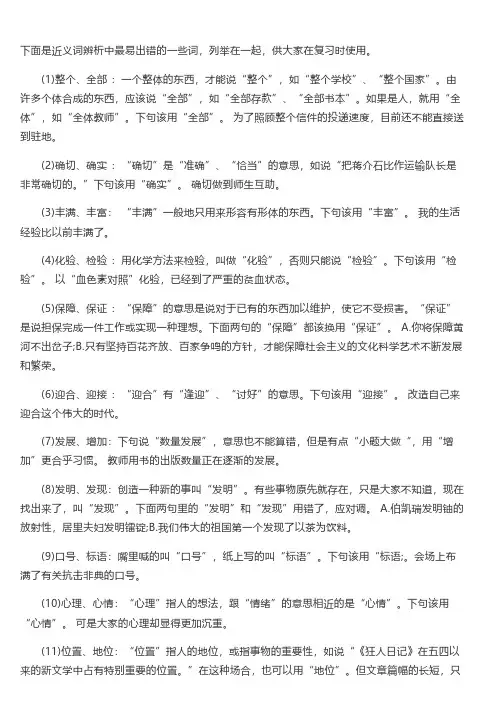
下面是近义词辨析中最易出错的一些词,列举在一起,供大家在复习时使用。
(1)整个、全部 :一个整体的东西,才能说“整个”,如“整个学校”、“整个国家”。
由许多个体合成的东西,应该说“全部”,如“全部存款”、“全部书本”。
如果是人,就用“全体”,如“全体教师”。
下句该用“全部”。
为了照顾整个信件的投递速度,目前还不能直接送到驻地。
(2)确切、确实 :“确切”是“准确”、“恰当”的意思,如说“把蒋介石比作运输队长是非常确切的。
”下句该用“确实”。
确切做到师生互助。
(3)丰满、丰富: “丰满”一般地只用来形容有形体的东西。
下句该用“丰富”。
我的生活经验比以前丰满了。
(4)化验、检验 :用化学方法来检验,叫做“化验”,否则只能说“检验”。
下句该用“检验”。
以“血色素对照”化验,已经到了严重的贫血状态。
(5)保障、保证 :“保障”的意思是说对于已有的东西加以维护,使它不受损害。
“保证”是说担保完成一件工作或实现一种理想。
下面两句的“保障”都该换用“保证”。
A.你将保障黄河不出岔子;B.只有坚持百花齐放、百家争鸣的方针,才能保障社会主义的文化科学艺术不断发展和繁荣。
(6)迎合、迎接 :“迎合”有“逢迎”、“讨好”的意思。
下句该用“迎接”。
改造自己来迎合这个伟大的时代。
(7)发展、增加:下句说“数量发展”,意思也不能算错,但是有点“小题大做“,用“增加”更合乎习惯。
教师用书的出版数量正在逐渐的发展。
(8)发明、发现:创造一种新的事叫“发明”。
有些事物原先就存在,只是大家不知道,现在找出来了,叫“发现”。
下面两句里的“发明”和“发现”用错了,应对调。
A.伯凯瑞发明铀的放射性,居里夫妇发明镭锭;B.我们伟大的祖国第一个发现了以茶为饮料。
(9)口号、标语:嘴里喊的叫“口号”,纸上写的叫“标语”。
下句该用“标语;。
会场上布满了有关抗击非典的口号。
(10)心理、心情:“心理”指人的想法,跟“情绪”的意思相近的是“心情”。
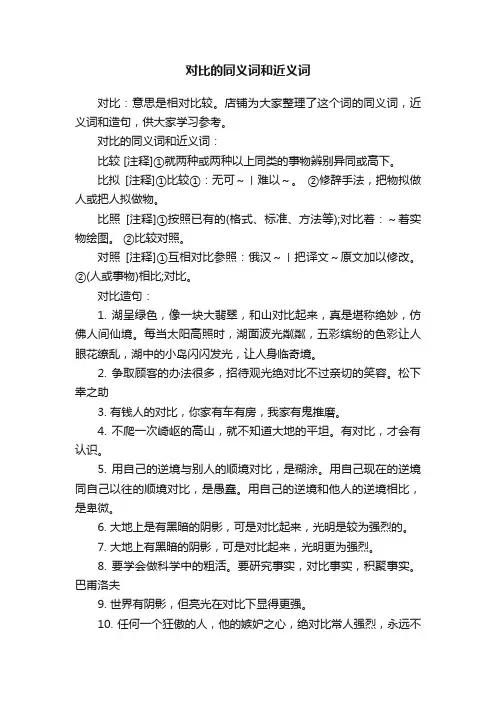
对比的同义词和近义词对比:意思是相对比较。
店铺为大家整理了这个词的同义词,近义词和造句,供大家学习参考。
对比的同义词和近义词:比较 [注释]①就两种或两种以上同类的事物辨别异同或高下。
比拟[注释]①比较①:无可~ㄧ难以~。
②修辞手法,把物拟做人或把人拟做物。
比照[注释]①按照已有的(格式、标准、方法等);对比着:~着实物绘图。
②比较对照。
对照[注释]①互相对比参照:俄汉~ㄧ把译文~原文加以修改。
②(人或事物)相比;对比。
对比造句:1. 湖呈绿色,像一块大翡翠,和山对比起来,真是堪称绝妙,仿佛人间仙境。
每当太阳高照时,湖面波光粼粼,五彩缤纷的色彩让人眼花缭乱,湖中的小岛闪闪发光,让人身临奇境。
2. 争取顾客的办法很多,招待观光绝对比不过亲切的笑容。
松下幸之助3. 有钱人的对比,你家有车有房,我家有鬼推磨。
4. 不爬一次崎岖的高山,就不知道大地的平坦。
有对比,才会有认识。
5. 用自己的逆境与别人的顺境对比,是糊涂。
用自己现在的逆境同自己以往的顺境对比,是愚蠢。
用自己的逆境和他人的逆境相比,是卑微。
6. 大地上是有黑暗的阴影,可是对比起来,光明是较为强烈的。
7. 大地上有黑暗的阴影,可是对比起来,光明更为强烈。
8. 要学会做科学中的粗活。
要研究事实,对比事实,积聚事实。
巴甫洛夫9. 世界有阴影,但亮光在对比下显得更强。
10. 任何一个狂傲的人,他的嫉妒之心,绝对比常人强烈,永远不能忍受任何一个人,有任何地方强过自己。
11. 战争不仅是军事力量的对比,也是政治、经济力量的对比,是各种力量的总决赛。
要保障战争的胜利,一定要把人力、物力、财力等各方面的力量组织好;战争的哪一方面多动员些力量,哪一方面就多一层胜利的保障。
12. 经过三年劳动教养,他现在重新做人了,今昔对比之下,他大有今是昨非之感。
13. 图中的双龙戏珠,色彩热烈活跃,用色对比强烈,两条金龙飞腾蜿蜒,张牙舞爪,强劲有力。
14. 这幅图卷是用极为浓重的色彩,以强烈的红绿对比的手法画出来的,例子不胜枚举,即此一斑,也能窥见色彩在诗人笔下可以产生何等神奇的魅力了。
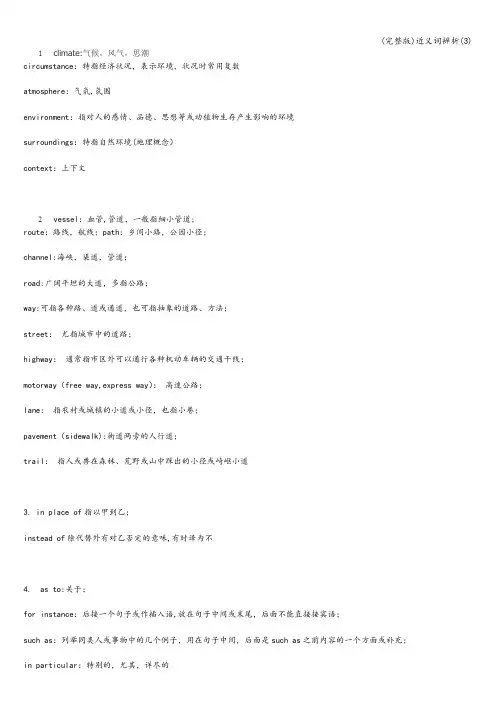
1climate:气候,风气,思潮circumstance:特指经济状况,表示环境,状况时常用复数atmosphere:气氛,氛围environment:指对人的感情、品德、思想等或动植物生存产生影响的环境surroundings:特指自然环境(地理概念)context:上下文2vessel:血管,管道,一般指细小管道;route:路线,航线;path:乡间小路,公园小径;channel:海峡,渠道,管道;road:广阔平坦的大道,多指公路;way:可指各种路、道或通道,也可指抽象的道路、方法;street:尤指城市中的道路;highway:通常指市区外可以通行各种机动车辆的交通干线;motorway(free way,express way):高速公路;lane:指农村或城镇的小道或小径,也指小巷;pavement(sidewalk):街道两旁的人行道;trail:指人或兽在森林、荒野或山中踩出的小径或崎岖小道3. in place of指以甲到乙;instead of除代替外有对乙否定的意味,有时译为不4. as to:关于;for instance:后接一个句子或作插入语,放在句子中间或末尾,后面不能直接接宾语;such as:列举同类人或事物中的几个例子,用在句子中间,后面是such as之前内容的一个方面或补充;in particular:特别的,尤其,详尽的for example:举例说明某一论点或情况,一般只举同类人或物中的“一个”为例,可位于句首、句中或句末5。
tighten:加紧,收紧,侧重强调数量,活动,情感,不和control搭配;intensify:加强,强化;fasten:系牢,扣紧,多接具体名词6。
rough:指某物表面凹凸不平,不光滑;coarse:指某物质地粗糙低劣或编织、加工等不精细、精巧。
也指人的言谈举止粗鲁,不文雅;harsh:指外表、性质、声音的粗糙、刺耳、刺目,强调使人不愉快的粗糙感;rude:指加工粗糙、不精细.也指某人的言行举止粗鲁无礼,缺乏修养;crude: 主要指未经加工处理尚处于自然状态的物质 crude oil;也可指人的言行粗鲁7. publicity:公开,宣传;popularity:普遍,流行;quality:既可指有形或无形的特性,又可指个性或共性的特征;property: 多指同类事物所共有的特性,一般不用于指人;feature: 指事物突出引人注目的特点。
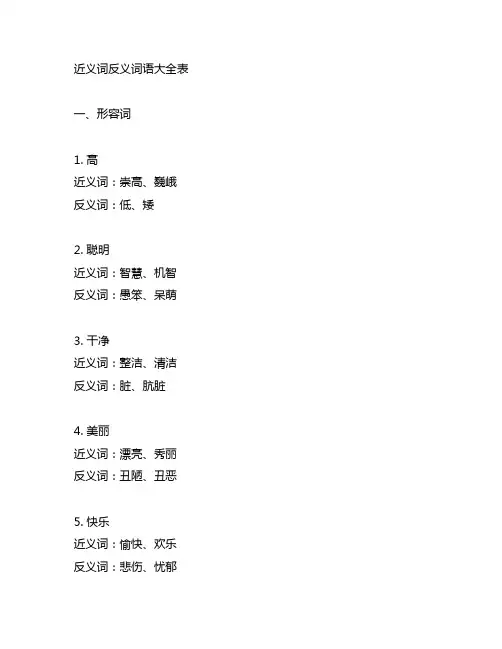
近义词反义词语大全表一、形容词1. 高近义词:崇高、巍峨反义词:低、矮2. 聪明近义词:智慧、机智反义词:愚笨、呆萌3. 干净近义词:整洁、清洁反义词:脏、肮脏4. 美丽近义词:漂亮、秀丽反义词:丑陋、丑恶5. 快乐近义词:愉快、欢乐反义词:悲伤、忧郁6. 勇敢近义词:英勇、刚毅反义词:胆怯、畏缩7. 轻松近义词:愉快、舒畅反义词:紧张、疲劳8. 愉快近义词:愉悦、欢畅反义词:烦躁、郁闷9. 坚强近义词:刚强、顽强反义词:软弱、懦弱10. 温暖近义词:温和、和煦反义词:寒冷、冰冷二、动词1. 走近义词:行走、步行反义词:停留、驻足2. 看近义词:观看、注视反义词:闭目、不看3. 听近义词:聆听、倾听反义词:不听、耳塞4. 唱近义词:吟唱、演唱反义词:哼唱、不唱5. 跳近义词:跳跃、飞跃反义词:踏步、不跳6. 写近义词:书写、记录反义词:删改、不写7. 吃近义词:饮食、进食反义词:饥饿、不吃8. 喝近义词:饮用、享用反义词:渴、不喝9. 睡近义词:就寝、安睡反义词:醒、不睡10. 玩近义词:游玩、嬉戏反义词:闲置、不玩三、名词1. 地球近义词:世界、球球反义词:天空、宇宙2. 太阳近义词:阳光、日光反义词:月亮、阴影3. 花近义词:鲜花、花朵反义词:草、树叶4. 树近义词:大树、古树反义词:灌木、草丛5. 鸟近义词:小鸟、飞鸟反义词:兽、鱼6. 猫近义词:小猫、猫咪反义词:狗、老鼠7. 鱼近义词:小鱼、游鱼反义词:鸟、猫8. 狗近义词:小狗、狗狗反义词:猫、老鼠9. 雨近义词:大雨、细雨反义词:晴天、干旱10. 风近义词:大风、微风反义词:寂静、无风四、副词1. 很近义词:非常、十分反义词:不、不太2. 快近义词:迅速、飞快反义词:慢、缓慢3. 慢近义词:缓慢、迟缓反义词:快、迅速4. 安静近义词:静谧、寂静反义词:吵闹、喧嚣5. 紧近义词:牢固、严实反义词:松散、不紧6. 稳近义词:稳固、平稳反义词:摇摆、不稳7. 远近义词:遥远、远方反义词:近、靠近8. 近近义词:接近、紧邻反义词:远、遥远9. 甜近义词:甘甜、甜美反义词:淡、不甜10. 酸近义词:酸甜、酸楚反义词:甜、不酸五、连词1. 而且近义词:并且、而且反义词:但是、然而2. 不仅近义词:不但、并且反义词:不是、只是3. 因为近义词:由于、由于反义词:所以、因此4. 虽然近义词:尽管、尽管反义词:但是、然而5. 而近义词:并且、同时反义词:但是、然而总结:通过学习了解了许多形容词、动词、名词、副词、连词的近义词和反义词,这些词语的学习能够丰富我们的语言知识,提高我们的语言水平。
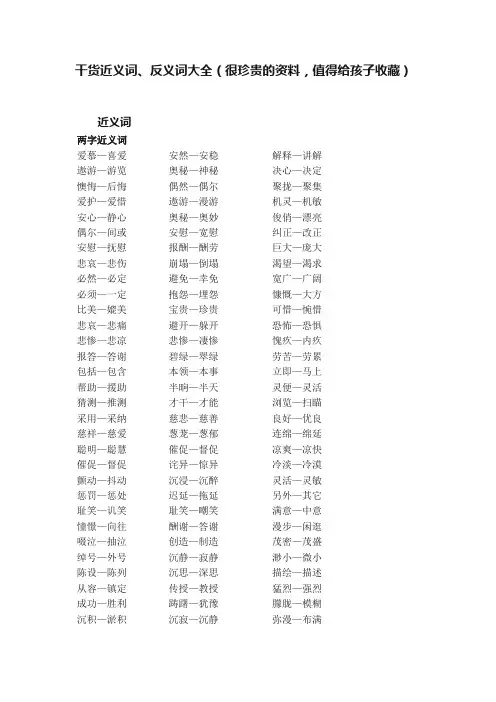
干货近义词、反义词大全(很珍贵的资料,值得给孩子收藏)近义词两字近义词爱慕—喜爱安然—安稳解释—讲解遨游—游览奥秘—神秘决心—决定懊悔—后悔偶然—偶尔聚拢—聚集爱护—爱惜遨游—漫游机灵—机敏安心—静心奥秘—奥妙俊俏—漂亮偶尔—间或安慰—宽慰纠正—改正安慰—抚慰报酬—酬劳巨大—庞大悲哀—悲伤崩塌—倒塌渴望—渴求必然—必定避免—幸免宽广—广阔必须—一定抱怨—埋怨慷慨—大方比美—媲美宝贵—珍贵可惜—惋惜悲哀—悲痛避开—躲开恐怖—恐惧悲惨—悲凉悲惨—凄惨愧疚—内疚报答—答谢碧绿—翠绿劳苦—劳累包括—包含本领—本事立即—马上帮助—援助半晌—半天灵便—灵活猜测—推测才干—才能浏览—扫瞄采用—采纳慈悲—慈善良好—优良慈祥—慈爱葱茏—葱郁连绵—绵延聪明—聪慧催促—督促凉爽—凉快催促—督促诧异—惊异冷淡—冷漠颤动—抖动沉浸—沉醉灵活—灵敏惩罚—惩处迟延—拖延另外—其它耻笑—讥笑耻笑—嘲笑满意—中意憧憬—向往酬谢—答谢漫步—闲逛啜泣—抽泣创造—制造茂密—茂盛绰号—外号沉静—寂静渺小—微小陈设—陈列沉思—深思描绘—描述从容—镇定传授—教授猛烈—强烈成功—胜利踌躇—犹豫朦胧—模糊沉积—淤积沉寂—沉静弥漫—布满觉察—发觉倘若—假如密切—紧密驰过—经过沉默—安静勉励—鼓励持续—延续颤抖—发抖藐视—轻视灿烂—明媚传说—传闻泯灭—消灭慈祥—慈爱打扮—装扮摹仿—模仿打搅—打扰胆怯—害怕模范—榜样淡忘—忘却叮嘱—嘱咐萌芽—发芽陡崖—悬崖对付—应付命令—指示对照—对比诞生—降生茂密—稠密短暂—瞬间独特—特别迷蒙—迷茫打扰—打搅担心—放心马上—立刻陡峭—峻峭悲哀—悲伤忙碌—劳碌遍布—遍及便捷—便利鸟瞰—俯视恩赐—赏赐飞驰—奔驰凝结—凝聚发布—公布发誓—宣誓凝视—注视发展—进展繁殖—生殖挪移—移动反抗—抵抗防御—防备难过—难受妨碍—阻碍分量—重量能手—专家分外—格外愤怒—愤慨偶尔—间或锋利—锐利服侍—侍侯便宜—廉价浮现—出现赋予—给予哺育—培育分辩—辩解富裕—宽裕判断—推断嘱咐—叮嘱发现—发觉批评—批判峰峦—山峰发愣—发呆僻静—偏僻覆盖—掩盖乏味—无聊疲倦—疲乏仿佛—好像吩咐—命令漂亮—美丽防御—抵御烦恼—烦闷飘荡—漂浮费解—难懂防止—预防品格—品行费用—花费反驳—反对朴实—质朴告别—告辞恭敬—尊敬盘问—追问估计—估量鼓励—鼓舞盘曲—盘旋固然—当然故意—有意平等—公平关心—关怀管理—治理奇妙—奇异贯通—贯穿瑰宝—珍宝气魄—气势规划—计划果然—果真气势—气概鼓励—鼓舞高悬—高挂清晰—清楚干枯—枯萎感叹—感慨清澈—清亮公正—公平观赏—欣赏清晰—清楚给予—送给感激—感谢驱赶—驱逐感触—感受高兴—难受凄苦—凄凉孤单—孤独赶紧—连忙勤奋—勤劳估计—估测感动—感激观赏—欣赏含糊—模糊寒冷—严寒轻蔑—轻视和蔼—和气宏伟—雄伟确实—实在欢跃—喜悦荒芜—荒凉轻柔—柔和回顾—回忆汇集—汇合弱小—微小获取—猎取罕见—少见热闹—喧哗和蔼—温和昏暗—阴暗认真—仔细缓慢—缓缓忽然—突然容许—允许呼喊—叫喊呼唤—召唤饶恕—宽恕呵护—保护湖边—湖畔松散—疏松好像—似乎会晤—会见思考—思索活泼—生动好梦—美梦赏识—赞赏后悔—懊悔害怕—畏惧伤害—损害荒芜—荒凉妒忌—嫉妒商议—商量机灵—灵巧积累—积存稍微—略微即将—马上疾驰—飞奔刹那—瞬间寄托—寄予皎洁—洁白神奇—奇妙讥笑—嘲笑坚固—牢固率先—领先坚毅—坚强艰苦—艰难肃静—安静建造—建筑交织—交错闪烁—闪耀娇嫩—柔嫩节制—克制生气—生机竭力—尽力解救—拯救四处—到处谨防—防备谨慎—慎重所有—全部惊险—危险精密—周密审视—审察精致—精巧敬仰—仰慕索性—干脆境界—境地居然—竟然探索—探究绝望—无望惊叹—惊奇推荐—推举惊恐—害怕寂寞—孤独妥帖—稳妥见谅—原谅敬佩—佩服同伴—伙伴结束—完毕决口—决堤同意—愿意聚集—集合积蓄—积攒蜿蜒—曲折居然—竟然拮据—困难顽强—坚韧教导—教育焦急—着急巍峨—雄伟洁净—干净集合—集中惟独—只有惊讶—惊奇寂寞—孤单危急—危险娇小—娇嫩维护—保护吸收—汲取稀罕—希奇稀罕—希奇稀罕—希奇形态—状态幼稚—稚嫩预计—估计滋味—味道照射—照耀终于—最终四字近义词名不虚传—名符其实恋恋不舍—依依不舍日夜不停—夜以继日异口同声—不约而同神气十足—得意洋洋左顾右盼—东张西望受益无穷—获益良多心旷神怡—赏心悦目飘飘悠悠—飘飘扬扬全神贯注—聚精会神一丝不苟—认认真真震耳欲聋—响彻云霄别具一格—独具匠心不可计数—不计其数风俗世情—风土人情毫不犹豫—坚决果断绞尽脑汁—费尽心机筋疲力尽—力倦神疲迥乎不同—绝然不同举世闻名—闻名遐迩聚精会神—全神贯注雷霆万钧—排山倒海络绎不绝—川流不息眉开眼笑—眉飞色舞目不转睛—聚精会神排山倒海—移山倒海疲惫不堪—筋疲力竭千磨万击—千锤百炼情不自禁—不由自主盛气凌人—不可一世随心所欲—为所欲为同心协力—同心同德无拘无束—自由自在喜不自胜—乐不可支腥风血雨—凄风苦雨一五一十—如数家珍依依不舍—恋恋不舍应有尽有—无奇不有反义词一字反义词大—小多—少左—右前—后冷—热高—低进—退黑—白天—地男—女里—外死—活公—私快—慢矛—盾宽—窄强—弱轻—重缓—急松—紧好—坏美—丑善—恶是—非闲—忙来—去分—合存—亡动—静浓—淡偏—正饥—饱爱—恨升—降开—关始—终胖—瘦迎—送盈—亏真—假虚—实有—无雅—俗是—否稀—密粗—细东—西巧—拙恩—怨新—旧正—邪通—堵止—行古—今曲—直亮—暗薄—厚哭—笑文—武推—拉问—答主—仆买—卖深—浅聚—散干—湿生—熟单—双首—末你—我敌—友警—匪盛—衰胜—败加—减软—硬阴—阳顺—逆反—正祸—福信—疑错—对藏—露老—少断—续钝—锐浓—淡雌—雄醒—睡止—行咸—淡正—歪凉—暖深—浅窄—宽远—近高—低冷—热横—竖涨—降隐—现同—异浑—清紧—松无—有明—暗细—粗嫩—老凹—凸轻—重二字反义词扩散—集中疑惑—坚信同意—反对虚心—骄傲弱小—强大反对—赞成正确—错误浪费—节约减少—增加贫穷—富裕熟悉—陌生遥远—附近倔强—温顺谦逊—骄傲终日—偶尔殷勤—冷淡孤独—热闹喜欢—讨厌奇特—平凡虚幻—真实甜蜜—苦涩清晰—模糊软弱—坚强严肃—和蔼动摇—坚定兴旺—衰败勤奋—懒惰肥胖—消瘦提高—降低成功—失败偶然—必然热闹—冷清外表—内心厄运—幸运微弱—强烈黑暗—明亮笔直—弯曲懒惰—勤劳害羞—大方舒服—难受惊诧—焦急乌黑—雪白俊俏—丑陋轻快—沉重鲜艳—暗淡增添—削减活泼—呆板害怕—勇敢聚拢—分散停止—开始好梦—恶梦玲珑—粗笨灵活—呆板陡峭—平坦离开—回归特殊—一般送行—迎接舒适—难受早先—以后裸露—遮盖黎明—黑夜减少—增加接受—拒绝悲惨—幸福愈合—开裂有名—无名严肃—随和熟悉—生疏忧伤—高兴飞快—缓慢成功—失败沉默—吵闹防御—进攻悲哀—高兴高尚—卑鄙烦恼—开心阻止—允许稚拙—老练迅速—缓慢掩盖—暴露温柔—粗暴轻柔—粗重旱灾—水灾清澈—浑浊巨大—渺少温暖—寒冷美丽—丑陋密切—疏远可爱—可憎光明—黑暗皎洁—昏暗付出—索取费解—易懂新鲜—陈旧便宜—昂贵丰富—单调节约—浪费幸福—痛苦晚霞—朝阳升起—落下犹豫—果断精致—粗糙猜测—肯定清晰—模糊稀少—繁多荒芜—繁盛漂亮—丑陋幸福—悲惨出现—隐藏燃烧—熄灭宽阔―狭窄平静―动荡加重―减轻缓慢―快速节省―浪费分散―聚拢茂盛—枯萎美丽—丑陋静寂—热闹清楚—模糊镇静—慌乱伸开—缩拢威武—沮丧巨大—细小神秘—平常寒冷—炎热原始—现代珍贵—普通舒服―难受弯曲―笔直牢固―脆弱新鲜―陈腐反面―正面干燥―潮湿平坦―崎岖简单―复杂粗糙―细腻幸福―悲惨谦虚―骄傲快乐―伤心宽阔―狭窄强健―软弱清澈―浑浊明白―糊涂茂密―稀疏伸出―缩回成功―失败寒冷―温暖愤怒―高兴灵活―笨拙准许―拒绝热情―冷淡勤劳―懒惰分散―聚集迅速—迟钝认真—马虎失败—胜利犹豫—果断坚定—动摇膨大—缩小迟钝—灵活笨重—轻便临时―长期慎重―马虎柔弱―刚强干燥―湿润光滑―粗糙静谧―热闹崭新―陈旧开始―结尾漂亮―丑陋喧闹―宁静容易―困难凋谢―盛开温暖―寒冷朋友―敌人寒冷―温暖山谷―山峰点燃―熄灭神奇―平常热闹―安静拽住―放开关心―冷漠高傲―谦逊郑重―轻率从容―慌张高兴―难过淘气―规矩讨厌―喜欢反抗―顺从忠厚―奸诈温暖―寒冷蜿蜒―笔直坚固―脆弱清楚―模糊陡峭―平坦伟大―渺小美丽―丑陋相同―不同古老―现代宏大―微小魁梧―矮小丰满―干瘪故人―新朋无名―有名懒惰―勤劳满意―失望灿烂―暗淡凋零―盛开容易―困难希望―失望安全―危险庄重―轻浮热情―冷淡坚强―懦弱宽裕―拮据神气―颓丧喜悦―忧伤快乐―悲伤繁华―萧条热闹―宁静褴褛―华丽踊跃―消极清晰―模糊仔细―粗心具体―大略温柔―粗暴危险―安全匆匆―慢慢认识―陌生疏远―亲近聪明―愚蠢长处―短处依赖―自立舒适―艰苦输入―输出陌生―熟悉打开―关闭凶猛―温和笨重―轻巧迟钝―灵敏相似―相反特殊―一般优良―低劣勤劳―懒惰俊俏—丑陋轻快—沉重鲜艳—暗淡增添—削减活泼—呆板聚拢—分散停止—开始灵活—呆板陡峭—平坦舒适—难受愈合—开裂英勇—怯懦精致—粗糙潮湿—干燥紧张—松弛好心—恶意炎热—寒冷违背—遵循怀疑—相信尊重—侮辱嘈杂—寂静凝结—溶解聚拢—分散伶俐—笨拙挺进—撤退密集—稀疏倾斜—竖直暴躁—温和四字反义词结结实实—松松垮垮惊慌失措—镇定自若朴实无华—华而不实五彩斑斓—五颜六色认认真真—马马虎虎异口同声—七嘴八舌神气十足—垂头丧气左顾右盼—全神贯注名不虚传—徒有虚名语无伦次—妙语如珠提心吊胆—高枕无忧恍恍惚惚—清清楚楚一模一样—截然不同柳暗花明—山穷水尽风平浪静—风号浪吼人声鼎沸―鸦雀无声勤勤恳恳―懒懒散散一丝不苟―敷衍了事隐隐约约―清清楚楚享誉世界―默默无闻相背而行―相向而行恍然大悟―百思不解筋疲力尽―精神抖擞名副其实—名不副实雪中送炭—雪上加霜歪歪斜斜—端端正正风平浪静—狂风恶浪迷迷糊糊—清清楚楚全神贯注—心不在焉断断续续—连续不断赏心悦目—触目惊心一丝不苟—粗心大意力倦神疲—精力充沛万马奔腾—无声无息暖暖和和—冷冷清清吞吞吐吐—干干脆脆毫不犹豫—犹豫不决别具一格—普普通通熙熙攘攘—冷冷清清心惊肉跳—镇定自如理直气壮—理屈词穷一朝一夕—日久天长悔过自新—执迷不悟群策群力—孤掌难鸣废寝忘食—饱食终日沸沸扬扬—鸦雀无声翻来覆去—简单明了吵吵嚷嚷—冷冷清清唇枪舌剑—心平气和粗制滥造—精雕细刻安居乐业—颠沛流离端端正正—歪歪斜斜面露愁容—面带微笑成竹在胸—胸有成竹本期编辑:文娜、吴珂欣。
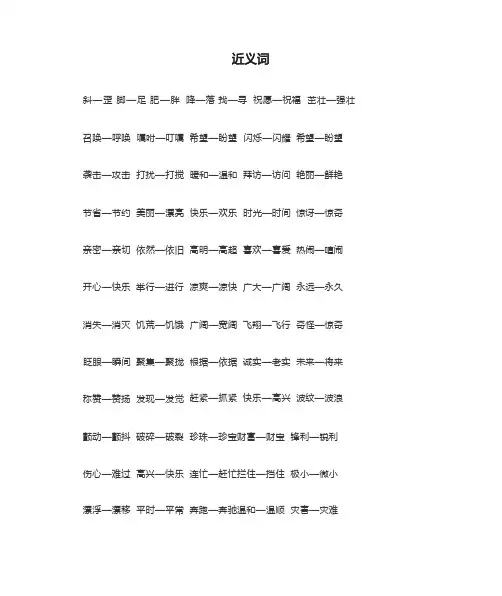
斜—歪脚—足肥—胖召唤—呼唤袭击—攻击节省—节约亲密—亲切开心—快乐消失—消灭眨眼—瞬间称赞—赞扬颤动—颤抖伤心—难过漂浮—漂移嘱咐—叮嘱打扰—打搅美丽—漂亮依然—依旧举行—进行饥荒—饥饿聚集—聚拢发现—发觉破碎—破裂高兴—快乐平时—平常降—落找—寻祝愿—祝福茁壮—强壮希望—盼望暖和—温和快乐—欢乐高明—高超凉爽—凉快广阔—宽阔根据—依据赶紧—抓紧闪烁—闪耀拜访—访问时光—时间喜欢—喜爱广大—广阔飞翔—飞行诚实—老实快乐—高兴希望—盼望艳丽—鲜艳惊讶—惊奇热闹—喧闹永远—永久奇怪—惊奇未来—将来波纹—波浪珍珠—珍宝财富—财宝锋利—锐利连忙—赶忙拦住—挡住极小—微小奔跑—奔驰温和—温顺灾害—灾难帮助—关心如果—假如洁净—干净费力—费劲烦恼—苦恼耽误—耽搁比赛—竞赛渐渐—慢慢办法—方法出发—动身逃窜—逃跑忽然—突然辽阔—宽阔温和—亲切仔细—认真特殊—特别使劲—用劲究竟—毕竟敞开—放开害怕—可怕脖子—颈项告别—离别观察—观看突然—忽然好似—好像昂首—仰头无数—很多愿意—同意传说—传奇目录—名目聆听—倾听领袖—首领救护—抢救挑选—选择拼命—舍命浪费—白费立刻—连忙招聘—聘请盼望—希望本事—本领干净—洁净躲藏—隐藏亲爱—友爱歌唱—唱歌准备—预备很多—许多热闹—吵闹连忙—急忙眼力—视力胆量—胆识保护—爱护寻找—查找洁白—雪白宾客—来宾流动—流淌正要—刚要故乡—家乡飞快—飞速清楚—清晰拾起—捡起美丽—秀丽安宁—安静连忙—赶忙浮上—浮现本事—本领劝告—劝说依赖—依靠凭着—靠着机灵—机智奔走—奔跑秘密—隐秘专心—用心著名—闻名奇怪—惊奇发现—发明好象—仿佛愤怒—气愤坚定—坚决仍旧—照旧录取—录用聊天—谈天盼望—希望培养—培育弯弯曲曲—曲曲折折连绵不断—连绵起伏赞不绝口—赞叹不已心惊肉跳—胆战心惊丝毫未动—纹丝不动眉开眼笑—喜笑颜开爱慕—喜爱安然—安稳奥秘—神秘懊悔—后悔报酬—酬劳悲哀—悲伤崩塌—倒塌必然—必定避免—幸免便宜—廉价哺育—培育猜测—推测才干—才能采用—采纳颤动—抖动沉浸—沉醉惩罚—惩处迟延—拖延耻笑—讥笑炽热—酷热憧憬—向往酬谢—答谢啜泣—抽泣创造—制造绰号—外号慈悲—慈善慈祥—慈爱葱茏—葱郁聪明—聪慧催促—督促璀璨—明亮打扮—装扮打搅—打扰胆怯—害怕淡忘—忘却调皮—淘气叮嘱—嘱咐妒忌—嫉妒对付—应付对照—对比恩赐—赏赐发布—公布发誓—宣誓发展—进展繁殖—生殖反抗—抵抗防御—防备妨碍—阻碍分量—重量分外—格外愤怒—愤慨锋利—锐利服侍—侍侯浮现—出现赋予—给予告别—告辞恭敬—尊敬估计—估量鼓励—鼓舞固然—当然故意—有意关心—关怀管理—治理贯通—贯穿瑰宝—珍宝含糊—模糊寒冷—严寒和蔼—和气宏伟—雄伟欢跃—喜悦环绕—围绕荒芜—荒凉回顾—回忆汇集—汇合获取—猎取祸患—祸害机灵—灵巧积累—积存即将—马上疾驰—飞奔寄托—寄予讥笑—嘲笑坚固—牢固坚毅—坚强艰苦—艰难艰难—困难建造—建筑交织—交错娇嫩—柔嫩节制—克制竭力—尽力解救—拯救谨防—防备谨慎—慎重惊险—危险精密—周密精致—精巧敬仰—仰慕境界—境地居然—竟然开辟—开发慷慨—大方可惜—惋惜空暇—空闲恐怖—恐惧控制—操纵款待—招待愧疚—内疚劳苦—劳累黎明—拂晓立即—马上灵便—灵活领略—领会浏览—扫瞄隆重—盛大沦陷—沦落罗列—排列满意—中意漫步—闲逛茂密—茂盛朦胧—模糊弥漫—布满密切—紧密勉励—鼓励勉强—牵强藐视—轻视泯灭—消灭明丽—明媚蓦地—突然模范—榜样鸟瞰—俯视凝结—凝聚凝视—注视挪移—移动偶尔—间或判断—推断批评—批判疲惫—疲乏疲倦—疲乏僻静—偏僻漂亮—美丽飘荡—漂浮飘拂—漂动品格—品行平生—终生平庸—平凡平整—平坦普通—一般欺凌—凌辱奇妙—奇异歧视—卑视气魄—气势气势—气概启示—启发清晰—清楚乾坤—天地潜伏—埋伏谴责—责备惬意—满意亲密—亲热轻蔑—轻视轻盈—轻快清纯—纯洁清晰—清楚驱赶—驱逐弱小—微小伤害—损害商议—商量商议—协商稍微—略微奢靡—奢侈神秘—神奇神奇—奇妙神奇—奇特审阅—批阅实用—有用舒畅—舒服思量—思考伺侯—侍奉肃静—安静素质—素养率先—领先贪婪—贪欲探索—探究逃避—躲避特殊—特别誊写—抄写体面—风光体味—体会推荐—推举妥帖—稳妥蜿蜒—曲折顽强—坚韧顽强—顽固宛然—仿佛宛如—犹如宛若—仿佛宛若—宛如巍峨—雄伟惟独—只有危急—危险尾随—跟随委托—托付温和—和气温和—温柔吸收—汲取希翼—希望稀罕—希奇袭击—突击吓唬—恐吓鲜明—鲜亮羡慕—艳羡向来—一直消失—消逝歇息—休息欣赏—观赏新鲜—新奇兴旺—兴盛兴许—或许凶猛—凶狠雄伟—宏伟修筑—修建羞愧—惭愧秀媚—秀丽徐徐—缓缓寻常—平常寻觅—寻找延续—连续严重—严峻遥望—眺望要挟—挟制依然—依旧游览—巡游黝黑—乌黑幼稚—稚嫩预计—估计愿意—情愿允许—同意暂时—临时阻挠—阻止赞赏—欣赏赞叹—赞美责怪—责备占领—占据照射—照耀照应—照顾珍贵—宝贵镇静—冷静征服—制服拯救—挽救争执—争吵指望—盼望骤然—突然注视—凝视追寻—寻找捉弄—戏弄茁壮—健壮滋味—味道纵情—尽情阻塞—堵塞恰好—刚好俏丽—美丽厌恶—讨厌镇静—镇定顽强—坚强猜测—推测稀薄—淡薄争论—争辩妥善—妥当潜伏—埋伏显然—明显迷糊—模糊蔓延—扩散舒展—展开驱逐—驱走误解—误会迫害—破坏赞赏—赞扬迷恋—沉迷祸患—灾祸骤然—忽然广阔—辽阔指望—希望照应—照顾疲倦—困倦恳求—请求朴素—俭朴处罚—惩罚妨碍—阻碍明了—明白风险—危险鼓励—鼓舞慰藉—安慰新鲜—新奇出生—诞生洪亮—嘹亮抵御—抵挡神秘—神奇主人—仆人渴望—盼望奇妙—美妙寂静—安静即将—马上清晨—早晨珍贵—贵重慈悲—仁慈茂密—茂盛继续—陆续艳丽—明丽倘若—假如逼近—靠近彻低—完全精致—精美瞭望—眺望贡献—奉献矫健—强健果然—果真谦虚—谦逊迷蒙—迷漫证实—证明联系—联络悦耳—动听隐蔽—隐藏寻常—平常惬意—满意惊讶——吃惊朦胧——模糊优惠——优待精巧——精致完美——完善逻辑——规律兴许——也许轻巧——轻松率先——首先忙碌——劳碌欣赏——赏识寻觅——寻找会晤——会见感触——感受振奋——振作生气——生机慈祥——慈爱五光十色——五彩缤纷连绵不断——连续不断若隐若现——时隐时现别具一格——独具匠心不可计数——不计其数风俗世情———风土人情毫不犹豫——坚决果断绞尽脑汁——费尽心机筋疲力尽———力倦神疲迥乎不同——绝然不同举世闻名——闻名遐迩聚精会神——全神贯注雷霆万钧——排山倒海络绎不绝——川流不息眉开眼笑——眉飞色舞目不转睛——聚精会神排山倒海——移山倒海疲惫不堪———筋疲力竭千磨万击——千锤百炼情不自禁——不由自主盛气凌人——不可一世随心所欲——为所欲为同心协力———同心同德无拘无束——自由自在喜不自胜——乐不可支腥风血雨——凄风苦雨一五一十——如数家珍依依不舍——恋恋不舍应有尽有——无奇不有朝夕与共——朝夕相处震耳欲聋——响彻云霄成竹在胸——胸有成竹反义词胖—瘦香—臭明—暗忙—闲凉—暖来—去尖—钝好—坏轻—重前—后左—右是—非有—无老—少深—浅高—低快—慢升—降入—出开—关斜—正落—升冷—热饿—饱贫—富死—活穷—富买—卖旧—新细—粗明—暗首—尾始—终暖—寒缓—急宽—窄甘—苦外—内先—后卖—买闲—忙俯—仰浮—沉紧—松饱—饥伸—缩寒—暖隐—现明—暗此—彼朝—暮洁白—漆黑美丽—丑陋仔细—马虎告别—会合舒服—难受粗心—细心出发—归来安宁—喧闹宽敞—狭窄困难—容易热闹—寂静空闲—忙碌打开—关闭流动—固定暖和—寒冷弯曲—笔直喜欢—讨厌傍晚—清晨经常—偶尔保护—破坏飞快—缓慢特别—普通洁净—肮脏坚固—松散微笑—悲伤欢快—沉重秘密—公开愤怒—高兴勇敢—懦弱明白—糊涂漂亮—丑陋飞快—缓慢凝结—离散昂首—低头机灵—愚笨高大—矮小坚定—犹豫聪明—愚蠢失败—成功高兴—伤心极小—极大陡峭—平坦开始—结束明白—糊涂坚定—动摇清楚—模糊失败—成功烦恼—高兴仔细—粗心温和—暴躁伟大—渺小现在—将来希望—失望张开—合拢熟悉—陌生敞开—关闭特殊—一般精彩—枯燥温顺—凶猛沸腾—沉寂壮丽—晦暗呈现—消失静寂—嘈杂便宜—昂贵迟钝—敏捷兴奋—忧愁美丽—丑陋天堂—地狱弯曲—笔直懒惰—勤快宽裕—拮据隐藏—公开平坦—坎坷柔弱—坚强干燥—潮湿古老—现代故人—新交蜿蜒—笔直凝结-溶解增长—减短崭新—陈旧安静—吵闹简单—复杂勇猛—怯懦附近—遥远寒冷—温暖温柔—凶恶尽职—失职轻盈—笨重微波—巨浪聚集—分散明亮—暗淡蜿蜒—笔直善良—凶恶马虎—认真生疏—熟练卓越——平凡伟大—渺小朴实—华丽安全—危险冷淡—热情犹豫—果断松散—紧凑减产—增产下降—上升破坏—保护容易——困难灵巧——笨拙敏锐—迟钝立刻—迟缓宽敞—狭窄平衡—倾斜提高—降低沉寂—喧闹黝黑—白皙和平—战争顺畅—阻塞坚强—柔弱遵从—违反骄傲—谦虚完整—残缺坚硬—柔软糟蹋—爱惜有限—无限失望—希望清晰—模糊温暖—寒冷明白—疑惑朴素—华丽公开—保密独特—普通微弱—强烈漆黑—明亮消失—出现责备—表扬固执—随和特别—一般细致—粗糙舒服—难受疑惑—明白坚定—动摇错误—正确偶尔—经常静止—移动枯萎—茂盛疲倦—充沛骄傲—谦虚沉醉—苏醒善良—凶恶温柔-粗暴坚硬—松软新鲜—陈旧活泼—呆板容易—困难坚定—动摇俊俏—丑陋躲藏—暴露依赖—独立漂亮—丑陋紧张—放松清凉—闷热片刻—长久敏感-迟钝堵塞—畅通破碎—完整赶紧—拖延成功—失败凶恶—善良乌黑—洁白漆黑—光明从容—慌张违抗—服从违抗—遵从违背—遵从光滑—粗糙清闲—忙碌粗俗—文雅陌生—熟悉真理—谬论强壮—瘦弱仰望—俯视平坦—陡峭贫瘠-肥沃强大-弱小好事—坏事奔跑—停止昂贵—便宜锋利—迟钝未来—现在诚实—狡猾凉爽—炎热永远—短暂纯洁—污浊明白—糊涂轻快—沉重自在—拘束承认—否认难过—高兴遭殃-幸运灾害—幸福聚集—分散可爱—可恨广阔—狭小相信—怀疑高明—低劣倔强—温顺慌忙—从容损失—受益故意—无意发展—落后茂密-稀疏杰出-平庸增添-减少好心-恶意空虚-充实宽容-狭隘裂开—合拢热闹—冷清明白—糊涂方便—麻烦干燥—湿润防御—进攻拥有—失去灿烂-黯淡恶劣-良好朴素-奢侈破碎-完整伶俐-笨拙简陋-豪华相信—怀疑喜欢—讨厌镇定—惊慌便宜—昂贵精通-生疏黑暗—光明吝啬-大方团结-分裂显赫-卑微蔑视-尊重酥软-坚硬诚实-说谎异常-平常节省—浪费茁壮—虚弱稀少—稠密昏暗—明亮温暖—寒冷悦耳—刺耳幼稚-成熟兴旺-衰败迟延-提前诚意-假意炎热-寒冷狭窄-宽阔魁梧-瘦弱亲密—疏远批评-表扬狭窄—宽阔维护—破坏痛苦—快乐伤害—保护含糊-清楚特殊-普通惩罚-奖励拒绝-接受仔细-马虎晦暗-明亮精致-粗糙歧视-重视魁梧-矮小示弱-逞强聪明-愚蠢勇敢-懦弱幸福-痛苦穷苦-富裕危险-安全坚定-动摇持续-中断美丽-丑陋熟悉-陌生弯曲-笔直新鲜-腐烂高昂-低落衰老-年轻倾斜-竖直明朗-阴沉沉着-惊慌忧虑-放心繁荣-衰败忧伤-快乐吃力-轻松暴躁-温顺骄傲-谦虚牢固-松散集中-分散自在-拘束淡雅-浓艳复杂-简单残破-完整坚强-脆弱蜷缩-伸直淘气-老实漆黑-明亮凉爽-温暖腼腆-大方懦弱-坚强超常-失常粗糙-光滑扩大-缩小清醒-糊涂肯定-否定簇拥-分散崎岖-平坦潮湿-干燥统一-分裂紧张-松弛大概-精确节省-浪费消失-显现减少-增加平静-动荡沮丧-兴奋藏匿-公开柔和-严厉熟识-生疏团结-分裂陡峭-平缓寒冷-炎热悲伤-愉快险峻-平缓茂盛-枯萎严重-轻微外表-内心保护-破坏郑重-随意刚强-软弱出现-消失伶俐-笨拙害羞-大方洒脱-拘谨热烈-平静严寒-酷暑慌忙-镇定朴素-华丽深奥-浅显扩散-集中重逢-离别存在-消失精彩-糟糕指望-失望漂浮-沉没关切-冷落疑惑-坚信发掘-埋没严肃-活泼健美-衰弱详细-简略综合-分解偶尔-经常浏览-精读放肆-谨慎平庸-优秀精细-粗糙真理-谬误强盛-衰弱承受-推却挺进-撤退拘束-随便贫瘠-肥沃密切-疏远稀罕-平常冲锋-退却及时-耽误允许-禁止辽阔-狭小绽放-凋谢尊重-侮辱推测-断定湍急-平缓老实-狡猾个性-共性敬佩-鄙视洪亮-低沉寻常-特殊揳入-退出快活-忧伤机灵-笨拙迅速-缓慢耐心-急躁嘲笑-称赞迅猛-缓慢慷慨-吝啬隐蔽-暴露厄运-好运俊俏-丑陋开放-封闭失信-守信坚强-软弱掩盖-揭露镇定-紧张严寒-酷暑笨重-轻盈抑制-张扬危险-安全生气勃勃—死气沉沉雪中送炭-雪上加霜歪歪斜斜-端端正正马马虎虎-认认真真漫不经心-全神贯注 心平气和-暴跳如雷 筋疲力尽-精神抖擞 人声鼎沸-鸦雀无垂头丧气-兴高采烈 人山人海-寥寥无几 愁眉紧锁-喜笑颜开 不计其数-屈指可得意洋洋—垂头丧气变化莫测-一成不变 荒无人烟-人烟稠密 震耳欲聋-鸦雀无声前赴后继-畏缩不前垂头丧气-昂首挺胸心惊肉跳-镇定自若断断续续-连续不断漫不经心-专心致志 隐隐约约-清清楚楚 隐隐约约—清清楚楚歪歪斜斜-端端正正枝繁叶茂-枯枝败叶迷惑不解-恍然大悟毫不犹豫-犹豫不决一丝不苟-马马虎虎盛气凌人-平易近人目瞪口呆-谈笑自若力倦神疲-精力充沛垂头丧气-扬眉吐气人声鼎沸—鸦雀无声名副其实-名不副实理直气壮-理屈词穷万古长青-昙花一现熙熙攘攘-冷冷清清完整无缺-支离破碎宽阔――狭窄 平静――动荡 风平浪静—风号浪吼 涨—降 隐—现人声鼎沸――鸦雀无声加重――减轻 缓慢――快速 节省――浪费 分散――聚拢 茂盛—枯萎数 声美丽—丑陋静寂—热闹清楚—模糊镇静—慌乱伸开—缩拢威武—沮丧笑盈盈—哭啼啼恍恍惚惚—清清楚楚一模一样—截然不同巨大—细小神秘—平常原始—现代寒冷—炎热珍贵—普通深—浅窄—宽远――近高――低冷――热横――竖同—异浑—清丰年—歉年柳暗花明—山穷水尽舒服――难受弯曲――笔直紧――松均匀――悬殊牢固――脆弱新鲜――陈腐明――暗反面――正面伸出――缩回细――粗嫩――老干燥――潮湿平坦――崎岖简单――复杂粗糙――细腻幸福――悲惨谦虚――骄傲快乐――伤心宽阔――狭窄强健――软弱清澈――浑浊勤勤恳恳――懒懒散散明白――糊涂茂密――稀疏成功――失败寒冷――温暖愤怒――高兴灵活――笨拙准许――拒绝热情――冷淡勤劳――懒惰分散—聚集迅速—迟钝认真—马虎失败—胜利犹豫—果断坚定—动摇膨大—缩小迟钝—灵活笨重—轻便临时――长期慎重――马虎柔弱――刚强干燥――湿润光滑――粗糙静谧――热闹凹――凸崭新――陈旧开始――结尾漂亮――丑陋喧闹――宁静容易――困难凋谢――盛开温暖――寒冷朋友――敌人山谷――山峰点燃――熄灭神奇――平常笑嘻嘻――哭兮兮热闹――安静拽住――放开一丝不苟――敷衍了事奢侈――寒酸张老实――狡猾温柔――粗暴关心――冷漠高傲――谦逊郑重――轻率从容――慌张敏捷――迟缓公――母合上――打开浮――沉从容――慌丰富――贫乏高兴――难过淘气――规矩讨厌――喜欢反抗――顺从忠厚――奸诈温暖――寒冷蜿蜒――笔直坚固――脆弱清楚――模糊陡峭――平坦伟大――渺小美丽――丑陋相同――不同古老――现代隐隐约约――清清楚楚享誉世界――默默无闻宏大――微小魁梧――矮小无名――有名懒惰――勤劳容易――困难丰满――干瘪凉――暖满意――失望希望――失望故人――新朋朝――暮轻――重相背而行――相向而行灿烂――暗淡凋零――盛开安全――危险可怜――可恨庄重――轻浮热情――冷淡坚强――懦弱恍然大悟――百思不解宽裕――拮据神气――颓丧喜悦――忧伤快乐――悲伤繁华――萧条热闹――宁静;褴褛――华丽踊跃――消极清晰――模糊仔细――粗心具体――大略温柔――粗暴危险――安全匆匆――慢慢筋疲力尽――精神抖擞认识――陌生疏远――亲近聪明――愚蠢长处――短处现代――古代依赖――自立美好――丑陋舒适――艰苦输入――输出陌生――熟悉打开――关闭凶猛――温和笨重――轻巧迟钝――灵敏相似――相反特殊――一般美妙――蹩脚优良――低劣勤劳――懒惰大——小多——少上——下左——右前——后黑——白死——活宽——窄松——紧是——非存——亡饥——饱始——终真——假是——否巧——拙通——堵冷——热天——地公——私强——弱好——坏闲——忙动——静爱——恨胖——瘦虚——实稀——密恩——怨止——行高——低男——女快——慢轻——重美——丑来——去浓——淡升——降迎——送有——无粗——细新——旧古——今进——退里——外矛——盾缓——急善——恶分——合偏——正开——关盈——亏雅——俗东——西正——邪张——弛曲——直输——赢纵——横哭——笑主——仆干——湿首——末盛——衰阴——阳信——疑断——续醒——睡亮——暗逆——顺得——失文——武买——卖彼——此你——我胜——败顺——逆错——对钝——锐止——行亲——疏苦——甜南——北推——拉深——浅生——熟敌——友加——减反——正藏——露浓——淡咸——淡收——放忠——奸薄——厚问——答聚——散单——双警——匪软——硬祸——福老——少雌——雄正——歪名副其实——名不副实雪中送炭——雪上加霜歪歪斜斜——端端正正风平浪静——狂风恶浪迷迷糊糊——清清楚楚——触目惊心一丝不苟——粗心大意—冷冷清清吞吞吐吐——干干脆脆——冷冷清清心惊肉跳——镇定自如—执迷不悟群策群力——孤掌难鸣——简单明了吵吵嚷嚷——冷冷清清——颠沛流离全神贯注——心不在焉力倦神疲——精力充沛毫不犹豫——犹豫不决理直气壮——理屈词穷废寝忘食——饱食终日唇枪舌剑——心平气和断断续续——连续不断赏心悦目万马奔腾——无声无息暖暖和和—别具一格——普普通通熙熙攘攘一朝一夕——日久天长悔过自新—沸沸扬扬——鸦雀无声翻来覆去粗制滥造——精雕细刻安居乐业正常——异常轻蔑——敬重怀疑——相信嘈杂——寂静非凡——平凡开心——苦闷强盛——衰败美丽——丑陋特别——一般扫兴——高兴寻常——异常违背——遵循尊重——侮辱激烈——平静信奉——背弃失信——守信率领——追随聚拢——分散严寒——酷暑拒绝——同意坚强——软弱平坦——崎岖痛快——难受崎岖——平坦伶俐——笨拙镇定——慌张洒脱——拘谨沉重——轻盈饱满——干瘪退化——进化增添——减少安谧——嘈杂清醒——糊涂微云——浓云凝结——溶解伟大——渺小活泼——呆板鲜艳——暗淡温暖——凉爽柔和——严厉荒芜——耕种清晰——浑浊纯熟——生疏陌生——熟悉光滑——粗糙幽静——喧闹刚强——软弱怕羞——大方团结——分裂明朗——阴沉迂回——径直衰弱——强健慎重——随便慌忙——镇定羞涩——大方清澈——浑浊喜欢——厌恶熟识——生疏严寒——炎热脆弱——坚强犹豫——坚定相宜——不宜平常——奇特胜利——失败宽敞——狭窄有趣——乏味结束——开始撒谎——诚实可爱——可恶赞许——反对高兴——难过紧张——松弛听从——违抗丰收——歉收自在——拘束勤劳——懒惰挺进——撤退倾斜——竖直舒畅——苦闷紧张——轻松慈祥——凶恶紧张——轻松淡水——咸水飞快——缓慢有趣——乏味诚实——虚伪复杂——简单喜欢——讨厌闻名——无名整齐——纷乱仔细——粗心精彩——平淡承认——否认淡妆——浓抹密集——稀疏认识——陌生安全——危险附近——远方笨重——轻便高兴——伤心起劲——没劲简单——复杂容易——困难暴躁——温和熟练——生疏准确——错误近处——远处温和——严厉气愤——欢喜高兴——痛苦粗心——细心美丽——丑陋宽阔——狭窄洁白——乌黑崭新——陈旧危险——安全兴旺——衰败团结——分裂常常——偶尔敏捷——迟钝幼稚——老练光明——黑暗含糊——清楚严重——轻微微弱——强大茂密——稀疏杰出——平庸异常——平常恶劣——良好灿烂——暗淡简陋——豪华特殊——普通诚意——假意迟延——提前理屈——理直拒绝——接受示弱——逞强惩罚——奖励好心——恶意诚实——撒谎聪明——愚笨晦暗——明亮宽容——严格寂静——热闹穷苦——富裕糟糕——精彩喜欢——讨厌紧张——松弛繁荣——衰败破碎——完整仔细——马虎空虚——充实勇敢——懦弱表扬——批评聪明——愚笨精致——粗糙潮湿——干燥危险——安全统一——分裂精致——粗糙酥软——坚硬伶俐——笨拙一向——偶尔健康——虚弱寂寞——喧闹权利——义务炎热——寒冷狭窄——宽阔善良——凶恶忧虑——放心奴隶——主人黑—雪白俊俏—丑陋轻快—沉重鲜艳—暗淡增添—削减活泼—呆板聚拢—分散停止—开始玲珑—粗笨灵活—呆板陡峭—平坦特殊—一般送行—迎接舒适—难受悲惨—幸福愈合—开裂有名—无名离开—回归害怕—勇敢忧伤—高兴飞快—缓慢成功—失败镇定--慌张严寒--温暖恶劣-优良湿润--干燥端端正正--歪歪斜斜激烈-- 平静狼狈--潇洒英勇 -- 怯懦危险——安全担心——放心朦胧——清楚高兴——难受便宜——昂贵喜欢——讨厌筋疲力尽——干劲十足魁梧——矮小敏锐—迟钝失望——期望紧张——松懈面露愁容——面带微笑。
2020年国家公务员考试行测200个常考近义词语对比汇总(精选)1 [类似相似]“类似”仅是情况,形态等的大致相像。
“相似”则是二者有许多相似之处,程度比“类似”更像。
2 [厉害/利害]“厉害”指猛烈,严厉,形容词,如“运动量一加大,我的心脏就跳得厉害”。
“利害”指利益和危害,名词,如“同学们之间没有根本的利害冲突”。
3 [利害厉害]“利害”①利益和损害,如:这是利害攸关的事。
②难以对付或忍受;剧烈,凶猛。
如:这人可利害;天热得利害。
“厉害”难以对付或忍受:剧烈,凶猛(与利害②相同)。
4 [连续陆续]“连续”多指事物或行动在空间或时间上的距离比较紧密均衡。
“陆续”则指时间上有间隔,前后的连接不均衡。
5 [连带/裙带]二者都表示有关联,不同的是:前者指互相关联,中性,如“人的作风与思想感情是有连带关系的”;后者比喻跟妻女姊妹等有关的,贬义,多含讽刺意味,如“裙带关系”,“裙带风气”等。
6 [粮站/粮栈]相同点:都是名词,都是存放粮食的地方。
不同点:“粮站”指调拨管理粮食的机关,如“这份粮油调拨单需要粮站盖章才能有效”;“粮栈”即经营批发业务的粮店,存放粮食的货栈,如“为方便群众,小区新设了粮栈”。
7 [吝啬/吝惜]二者都有过分爱惜财物的意思。
不同的是:“吝啬”主要指当用的不用,贬义;“吝惜”表示珍惜,指舍不得拿出自己的东西,多含中性。
8 [凌晨/零辰]这两个词语表示的时间不同。
“凌晨”指天快亮的时候,如“凌晨三点”。
“零辰”指夜里点正,如“今天夜间零辰就出发”。
9 [聆取/领取]相同点:都有取得的意思,动词。
不同点:“聆取”指听取教诲、指示等,书面用语,如“聆取您的谆谆教诲”;“领取”指取得发给的东西,多指客观事物,如“请你赶快去领取本月的工资”。
10 [领会领悟]“领会”对象多是抽象事物,如“精神、意图、心情”等。
“领悟”指理解,弄明白,对象多是抽象事物,如:含义、道理等。
11 [包括包罗包含包涵]“包括”可指具体事物,又可指抽象事物,如意识形态,包括政治、法律、道德等思想观点。
对比的同义词_近义词_反义词_字词解析对比的近义词/同义词:对照:相互对比参照。
比拟:1.修辞手法的一种,包括拟人、拟物。
2.对比,比较。
比照:1. 按照我们可以比照其它的计划来制定计划。
2. 对照两相比照。
比较:1.对比几种同类事物的异同、高下。
2.表示具有一定程度。
对比的反义词:无对比在汉语词典的解释:1. 把两种不同的事物或情况互相比较。
●郁达夫《花坞》:「但泥墙倾圮,蛛网绕梁,与壁上挂在那里的字画屏条一对比,极自然地令人生出了‘俯仰之间,已成陈迹’的感想。
」●秦牧《艺海拾贝·跋》:「任何譬喻都仅仅是对比其中的一点罢了,两种事物决不可能完全相提并论。
」2. 犹比例。
如:女同志和男同志的人数对比是二比三。
用对比造句1、一个沉静,一个活泼,这对双胞胎的性格形成了鲜明的对比。
2、这两支球队,力量对比,相差悬殊。
3、新旧社会对比,简直是两重天。
4、汉文帝的仁德与汉武帝的穷兵黩武形成了强烈的对比。
5、她和你的性格对比起来真是南辕北辙。
6、经过三年劳动教养,他现在重新做人了,今昔对比之下,他大有今是昨非之感。
7、今天看到中澳生活对比的几组数字,突然恍然大悟,明白了自己为什么喜欢澳洲。
8、一个运筹帷幄的人,必须胸怀大志、眼光敏锐、能够随机应变,对敌我双方的实力对比、战局变化了如指掌,并善于把握时机,果断出击。
9、老师布置手抄报,有的同学随便做一张敷衍老师,老师做事可认真啦,两者形成了鲜明的对比。
10、一些官员季伦锦障,和穷苦人家的四壁萧然形成了鲜明的对比。
11、先生潜心学问,埋头科研,欣欣然自乐。
与那些抗尘走俗之人,形成了鲜明的对比。
[解题要领]释义1、从语素辨析2、从词义得程度辨析3、从词义得范围辨析4、从色彩上辨析①感情色彩不同; ②语体色彩不同5、从语法特点来辨析①词性不同;②搭配对象不6、从词得本义、引申义、比喻义辨析现代汉语实词同音词释义辨析1、增殖增值2、简洁简截3、淡薄淡泊4、祛除驱除5、终止中止6、剧变巨变7、变幻变换8、处世处事9、暴发爆发10、国就是国事11、汇合会合12、溶化熔化13、考查考察14、沟通勾通15、法治法制16、灌注贯注17、抱怨报怨18、抱负报复19、世故事故20、过度过渡21、度过渡过22、功效工效23、作客做客24、需要须要25、修养休养26、义气意气27、震荡振荡28、以致以至29、质疑置疑30、权力权利31、其她其它32、遏制扼制33、独力独立34、不利不力35、不齿不耻36、推托推脱37、引见引荐38、蜕化退化39、就事就势40、推卸推解41、隐讳隐晦42乞求企求43、形迹行迹现代汉语实词近义词释义辨析1、局部部分2、边疆边境3、慈爱慈祥4、场所场合5、独创首创6、感动感激7、鼓励鼓舞8、顽固固执9、安置安排10、爱惜爱护11、大约大概12、耽搁耽误13、运动活动14、对比对照15、方式方法16、反复重复17、分配分派18、收集搜集19、举行举办20、误解曲解21、交流交换22、焦急焦虑23、次序秩序24、志愿自愿25、妨碍妨害26、掩盖掩饰27、郑重慎重28、压制抑制29、正规正轨30、规划计划31、恳切殷切32、声明申明33、摸索探索34、草率轻率35、特点特征36、体会体验37、停止停滞38、克服克复39、夸奖夸耀40、接受接收41、扶养抚养42、熟悉熟习43、努力竭力极力44、领略领会领悟45、首要主要重要46、罗列陈列排列47、关心关怀关切48、果然居然竟然49、规则规定规矩50、包括包含包涵51、过程进程历程52、采用采纳采集53、违反违背违犯54、宽阔广阔辽阔55、宽容宽恕饶恕56、轻视藐视蔑视鄙视57、连续陆续继续持续58、改进改正改善改良1、关于、对于关于表示关涉得范围。
关照:关心照顾关注:关心重视。
公然:公开的,毫无顾忌的(贬义)。
公开:(与秘密相对)不加隐蔽的。
开辟:打开通路,创立(从无到有)。
开拓:开辟矿展(从小到大)。
传诵:多用于美名传颂:多用于事迹。
沉重:分量大,程度重。
繁重:(工作、任务)多而重。
把戏:花招,蒙蔽人的手法。
伎俩:不正当的手段。
(贬义重)应付:对人对事采取措施/敷衍、将就(带宾语)周旋:交际应酬/与敌较量,相机而动(否)赔偿:因自己的行为造成损失而给予补偿。
补偿:抵消损耗,补足欠款。
废除:取消,废止(法令、制度、条约等)。
解除:去掉、破除(警报、顾虑、武装、职务)。
取消:使原有的制度、规章、资格、权利失去效力。
取缔:明令取消或禁止。
草率:(做事)不认真,敷衍了事。
轻率:(说话、做事)随随便便,不经过慎重考虑。
颁布:公布(法令条例,大的正规性文件)。
公布:(法令、文告、团体的通知)公开发布。
哺育:喂养/比喻培育。
抚育:照料、教育儿童/照管动植物。
偶尔:间或,有时候(副词,相对于经常)偶然:不一定要发生而发生。
(相对于必然)谎言:没有事实根据的消息。
流言:没有根据的话(多指背后议论、污蔑或挑拨的话)筹划:想办法、定计划/筹措(钱粮)。
惠顾:商店对顾客的敬词。
陈设:(动词)摆设。
摆设:(名词)指供欣赏的艺术品/徒有其表而毫无用处的东西。
专程:专为某事而到某地。
专诚:特地(心意诚恳)。
查访:调查打听案情。
察访:通过观察访问去进行调查,多公开进行。
专长:专门的学问技能;特长。
特长:特别擅长的技能或特有的工作经验。
风气:社会上或某个集体中流行的爱好和习惯。
风尚:在一定时期中社会上流行的风气和习惯。
风俗:社会上长期形成的风尚、礼节、习惯的总和。
指责:责问。
(可褒可贬)指摘:挑出错误,加以批评。
十足:(物品)成色纯/十分充足。
实足:数量足数的。
吞食:用于食物、药品等。
吞噬:形容侵吞。
(贬义)伪造:模仿真的东西。
捏造:无中生有。
流传:传下来或传播开。
(主要指消息、故事、传说、事物等)留传:遗留下来传给后代(如秘方、技艺等)恰巧:凑巧。
safe & securesafe (NOT IN DANGER) adjective -r, -stnot causing danger or not in dangera safe play-area for childrenI don't like going in a car with him - he's not a safe driver.Watch out! That ladder isn't safe - it's going to fall down.She wished us a safe journey.Is this medicine safe for children?It's safe to come out now - the danger's past.Your secret's safe with me (= I will not tell anyone what you have told me).In some cities you don't feel safe going out alone at night.We're safe from attack now - the enemy planes have gone.I know I put it somewhere safe (= where it could not be damaged, stolen or lost) but I just can't find it.Don't lose your passport - keep it in a safe place (= where it cannot be damaged, stolen or lost).Safe can also be used to describe things which do not involve any risk.Almost all the votes have been counted now, so I think it's safe to say (= there is little risk of being wrong if we say) that we've won.He's never remembered my birthday in his life, so it's a safe bet (= I am certain) he'll forget it again this time!The interviewers made the safe choice (= one that was not risky) and gave the job to the man they knew.If an official position in parliament is safe, it is likely to be won by the political party which has won it at previous elections.She's been chosen as a candidate for a safe Conservative seat.Dr Bailey is doing the operation, so your wife is in safe hands (= she is being cared for by someone skilled).(UK) If you invest your money with us, it will be as safe as houses (= you are very unlikely to lose it).I'm sure it won't rain, but I'll take an umbrella (just) to be on the safe side (= to be ready if it does rain).After three days lost in the mountains, all the climbers arrived home safe and sound (= completely without injury).(A) safe-conduct is (a document giving) official protection from harm while travelling through an area.They issued us with safe-conducts so that we could pass through enemy country.In exchange for the hostages, the terrorists demanded safe-conduct out of the country.A safe house is a house where someone can hide or shelter.The authorities discovered our safe house and captured two of our agents there.The safe period is the few days just before and during a woman's period when she is unlikely to become pregnant.Safe sex is the use of condoms or other methods of avoiding catching a disease, esp. AIDS, from sexual contact with someone else.safely adverbThe house was safely locked up.They all arrived safely, thank God.Drive safely (= Do not take any risks)!I think we can safely (= with no risk of being wrong) say they won't find us now.safety noun [U]a state in which or a place where you are safe and not in danger or at riskWith no thought for his own safety, he ran into the burning building to save the child.For your (comfort and) safety, we recommend you keep your seat belt loosely fastened during the flight.Journalists may enter the danger zone but unfortunately we cannot guarantee/assure their safety. Refugees should be allowed to return in safety to their own homes.The crew of the ship were winched to safety by a rescue helicopter.As the gunman opened fire, they all ran/dived for safety behind trees.You wouldn't get me on skis - I prefer to watch on TV from the safety of my own armchair.Many people are worried about the safety of the nuclear industry (= think it might be dangerous). Police are concerned for the safety of (= think that something bad might have happened to) a five-year-old who disappeared while playing in a wood near his home.The boy led the escaped prisoner to a place of safety (= somewhere he would not be in danger, esp. of being found).Safety can be used to describe something which protects a person or thing from a particular danger.safety checks/measuresa safety devicea safety harnessa safety helmetAmong the safety features of this car are anti-lock brakes and airbags.Safety regulations stipulate that the machine should be covered while it is in operation.A safety belt is a seat belt.A safety catch is a special part on something dangerous, esp. a machine or a gun, which preventspeople from using it unintentionally.In a theatre, the safety curtain is a curtain made of material which will not burn and which comes down between the stage and the part where people sit to prevent any fire that might happen from spreading.A safety deposit box is a safe deposit box.Safety-first means not showing a willingness to take risks.A safety-first attitude is best when it comes to driving.Safety glass is a type of glass, used esp. for car windows, that either stays in one piece in an accident, or breaks into small pieces which are not sharp.Safety glasses are special pieces of strong glass or plastic in a frame which fits tightly to a person's face to protect their eyes from dangerous chemicals or machines.A safety lamp (also Davy lamp) is a light used in a mine which can show if there is dangerous gas in a place, without any risk of causing the gas to explode.A safety match is a match that will only start burning if you rub it along a special surface on its box.A safety net is put below people performing at a great height to catch them and stop them from getting hurt if they fall.There was a safety net below the acrobats at the circus.(figurative) No one dies of hunger there because the government provides a safety net (= help for people in a difficult situation) of payments to the unemployed.A safety pin is a pin which has a round end into which the sharp point fits so that it is covered and cannot therefore stick into you. It is used for fastening things, esp. cloth.See picture: Pins and needlesA safety razor is a device for cutting hair on the face which has a blade that is partly covered, to prevent it from cutting the skin.A safety valve is a small part on a machine or device which allows steam or gas to escape if the pressure inside becomes too high.(figurative) For many people who suffer from stress at work, sport is a safety valve (= way of getting rid of strong feelings without hurting other people).(saying) 'There's safety in numbers' means that we will be or feel safer or more confident as a group.safeness noun [U]I'm a bit worried about the safeness of this machine for (= whether this machine will cause any danger to) children.‥‥‥‥secure (PROTECTED) adjective -r, -st(esp. of objects, situations etc.) able to avoid being harmed by any risk, danger or threatCar manufacturers ought to produce vehicles which are more secure against theft.Endangered species need to be kept secure from poachers.Some insurance companies offer lower premiums to people who make their houses more secure.secure verb [T]How can we secure the factory against vandals?The wall was built to secure the village from attack. [T]The building has only one main entrance and is easy to secure.(figurative) This form of investment is an excellent way of securing your children's financial future (= making certain they will have enough money in the future). [T]securely adverbThere are 15 000 kilometres of railway track, and it is impossible to guard it securely against terrorist attacks.This certificate is an important document, and should be kept securely (= in a place where it cannot be lost or stolen).security noun [U]Security is protection of a person, building, organization or country against threats such as crime, criminals and attacks by foreign countries.The station was closed for two hours because of a security alert.The banks deny that cash-machine withdrawals can be made as a result of computer error or internal breaches of security.I can't let you into the building without security clearance.Thirty demonstrators were killed in clashes with the security forces over the weekend.The tighter security measures include video cameras in the city centre.The students were deported because they posed a threat to national security.Extra security precautions are being taken to protect public buildings against bomb attacks.The proposed national identity card system would help to tighten security against fraud.The most dangerous criminals are held in maximum-security prisons (= prisons that are as difficult as possible to escape from).Security is also the group of people responsible for protecting a building.You'll need to notify security if you want to work late in the office. [+ singular or plural verb](UK) A security blanket is protection for a person or place threatened by a violent attack which involves preventing details of an activity from being discovered by the public.A security blanket was thrown around the President's visit because of the bomb threats. See also security blanket at secure (CONFIDENT).The Security Council of the United Nations is an organization with five permanent and ten temporary members whose purpose is to prevent war and maintain peace.The five permanent members of the UN Security Council are China, France, Russia, the UK and the US.Failure to comply with the Security Council resolution will result in sanctions being imposed.A security guard is someone whose job involves preventing people going into places without permission, delivering and collecting large amounts of money, or protecting goods from theft.To reassure the public, there are now two security guards at every entrance to the complex.A security risk is something or someone likely to cause danger or difficulty.Excavations so close to the Parliament buildings were regarded as presenting an unacceptable security risk.The only reason she was considered a security risk was because her husband was a foreigner.secure (FIXED) adjective -r, -stfixed, fastened or locked into a position which prevents movement; not likely to move or change That ladder doesn't look very secure to me.Just check that the door is secure - the lock doesn't always work properly.The prosperity of the country depends on a stable and secure peace.Her promotion has made her position in the company more secure.The museum has been promised ?2 million by the government, so its future is relatively secure.I wasn't sure if I was going to keep my job, so I wasn't financially secure.A secure place is one that it is difficult to get out of or escape from.He killed the man just a month after his release from a secure mental hospital.secure verb [T]If you secure one object to another you fasten it firmly to that object.The gate won't stay open, so we'll have to secure it to that post.securely adverbPlease ensure that your seatbelts are fastened securely.I'd locked my bike securely to a lamp-post but someone still managed to steal it.For a moment it looked as if he would drop the ball, but he held it securely.The election result leaves her securely in office until the end of the decade.He has given up political power, but he remains securely in control of the army.security noun [U]She has security of tenure at the university, which means she can work there for as long as she likes.If it's a choice between higher pay and job security, I'd prefer to keep my job.I've been unemployed for two years and have absolutely no financial security (= no certainty of having enough money to live on).secure (OBTAIN) verb [T] formalto get something, sometimes with difficultyHe was clearly disappointed by his failure to secure the top job with the bank.His secret mission to secure the release of the hostages ended in failure.The change in the law will make it harder for the police to secure convictions.secure (CONFIDENT) adjective -r, -sthaving few worries or doubts about yourself and your personal relationshipsChildren need to feel secure to do well at school.security noun [U]She said that she believes it to be important for children to have the security of a stable family life.A security blanket is a soft object such as a small piece of cloth or a toy which is very familiar to a baby or young child and makes it feel secure.(figurative) He never goes anywhere without his hat - it seems to be his security blanket. See also security blanket at secure (PROTECTED).secure (FINANCIAL) verb [T]to make certain that (money that has been lent) will be paid back by giving the lender the right to own things which belong to the borrower if the money is not paid backHer bank loan is secured against some shares that she inherited from her aunt.Large loans need to be secured by strong collateral.His business loan is secured on his house, so he could end up homeless if he doesn't repay it.If you wanted to borrow more than $5000, the bank would only be able to offer you a secured loan.security noun [U]She used her shares in the company as security against a $ 3 million bank loan.The hotel held onto our baggage as security while we went to the bank to change money to pay the bill.apparent, obvious & evidentapparent adjective able to be seen or understoodHer unhappiness was apparent to everyone.It was becoming increasingly apparent that he could no longer look after himself.I was on the metro this morning when for no apparent reason the man opposite suddenlyscreamed.Apparent also means appearing or being understood in one way when the real situation is different.There are one or two apparent discrepancies between the two reports.She has this apparent innocence which, I suspect, she uses to her advantage.They claimed the apparent deterioration in the economy was just a temporary change.apparently adverbApparently means 'it appears', esp. when you are not certain of the truth of the information you are going to give, or want to distance yourself from it.Well, apparently she's had enough of this country and she's heading off to Africa.Apparently, we have to change all the labels on the books during the next week.An eighty-year-old woman was badly hurt in what the police describe as an apparently motiveless attack (= it appeared to have no purpose, such as stealing).People also use apparently to mean 'in fact' when the real situation is different from what they thought it was.You know I told you Alice's party was on the 13th, well I saw her last night and apparently it's on the 14th.She looks about 12 but apparently she's 14.I thought they were married but apparently not (= they are not married).evident adjective easily seen or understood; obviousThe full extent of the damage only became evident the following morning.The audience waited with evident excitement for the performance to begin.It is evident that the robber knew the building well.From the smell it was evident that the drains had been blocked for several days.Harry's courage during his illness was evident to everyone.Her love for him was evident in all that she did.evidently adverbShe should have been here two hours ago so she's evidently decided not to come after all.He was evidently upset by the news of the accident.obvious adjective clear; easy to see, recognize or understandThe company representative will be obvious - she'll be wearing a red uniform.Speaking in obvious distress, he described his ordeal in prison.They do have a small child, and so for obvious reasons they need to find work as soon as possible.I know you don't like Helen, but there's no need to make it so obvious (to everyone).We all know the problems, so there's no need to state the obvious (= to say what everyone already knows).It is becoming obvious (that) the school will have to close.It's obvious what they want.There is no obvious solution.(disapproving) The play has an obvious (= too familiar and not imaginative) story line of the 'boy-meets-girl' variety.obviously adverbHe was in tears and obviously very upset.Obviously the school cannot function without teachers."We'll need some more food if they're staying." "Obviously."ensue /In"sju:, -"su:/ verb [I] formalto happen after something else, esp. as a result of itThe police officer said that he had placed the man under arrest and that a scuffle had ensued. [I] Soldiers began firing on each other and a gun battle ensued.Boredom often ensues from inactivity.ensuing /In"sju:.IN, -"su:-/ adjective [before noun; not gradable]He lost his job and in the ensuing (= following) months became more and more depressed.An argument broke out and in the ensuing (= resulting) fight, a gun went off.trace (FIND) verb [T] to find or discover about (something or someone) by examining the direction in which they have gone or the way in which they have developedThe police are trying to trace the mother of a new-born baby found abandoned outside a hospital. Attempts to trace the whereabouts of a man seen leaving the scene of the crime have so far been unsuccessful.Their missing daughter was finally traced to (= found in) Manchester.The phone company were unable to trace the call (= discover where it had come from).No one has yet been able to trace (= discover) the source of the rumour.The cause of the fire was traced to (= discovered to have been) an electrical fault.The American Democratic party traces its origins to (= has its origins in) the Democratic-Republican party, which came into being in the 1790s.To trace something is also to discover its cause or origin by examining the way in which it has developed.The outbreak of food poisoning was traced to some contaminated shellfish.The practice of giving eggs at Easter can be traced back to festivals in ancient China.Rivalries between the gangs can be traced back to (= first happened in) the 1950s in some black and Hispanic neighbourhoods.Alex Haley's book 'Roots' is about a black American who traces his ancestry back to an African slave. [T]To trace something is also to describe the way in which it has developed.The film traces the events leading up to the Russian Revolution in 1917.Her book traces the history of girls' education in Britain.trace nountraceable adjectiveIn theory, most telephone calls should be traceable (= it should be possible to discover where they have come from).follow (GO AFTER) verb to come or go after or go in the same direction as (someone or something), or to happen directly after (something else)The dog followed us home. [T]She got up and walked out of the room, and her husband followed. [I]The book was delivered yesterday with a note saying the bill for it would follow in a day or two.[I]He had the feeling he was being followed (= someone was going after him to catch him or see where he was going). [T]I could feel them following me with their eyes (= watching my movements closely). [T]His job has taken him all over the world, and his family have had to follow (him) (= go with him).[I or T]Follow (= Go in the same direction as) the road for two kilometres, then turn left. [T]Follow (= Go in the direction shown by) the arrows to the car park. [T]The path follows (= goes in the same direction as) the coastline for several kilometres. [T]Do your own thing, don't just follow the crowd (= do what everyone else does.) [T]We were not prepared for the events that followed (= happened next). [I]The meal consisted of smoked salmon, followed by guinea fowl (= with this as the next part). [T] She published a book of poems and followed it (up) with (= next produced) a novel. [T or M] Following on from what I said earlier (= Presenting the next part of what I was saying) (I)She was so good at her job, she'll be difficult to follow (= it will be difficult to do the same thing that she did). [T]Sophie always follows (= does the same as) what her sister does. [T]To follow a piece of music or writing is to read the notes or words at the same time as they are being played or said.You say as follows to introduce a list of things or to describe how to do something.The winners are as follows - Woods, Smith and Cassidy.Combine the ingredients as follows.If you follow in someone's footsteps, you do the same thing as they did previously.She followed in her mother's footsteps and started her own business.(informal) If you follow your nose, you trust your own feelings rather than obeying rules or letting yourself be influenced by other people's opinions.Take a chance and follow your nose - you may be right!He never reads reviews but follows his nose to find the best new literary talent.(informal) To follow your nose is also to go straight on.Turn left, then just follow your nose and you'll see the shop on your left.To follow suit is to do the same thing.When one airline reduces its ticket prices, the rest usually soon follow suit.To follow through (something)/follow (something) through is to continue to develop (it).The essay started interestingly, but failed to follow through (its argument).When you're playing a sport involving hitting or kicking a ball, it's important to follow through (your shot) (= complete the movement of hitting or kicking by continuing to move your arm or leg in the same direction.)To follow something up/ (US also) follow up on something is to find out more about it, or take further action connected with it.The idea sounded interesting and I decided to follow it up.The police officer took their names, but did not follow them up.I've got to go for a follow-up visit to the doctor next week.This meeting is a follow-up to the one we had last month.following adjective [before noun; not gradable]They arrived late at night, so did not see the garden until the following day (= the next day).The following items (= those which will now be listed) have been found - a ring, some money and a watch.following plural nounThe following are the people or things which are going to be listed.Will the following please stand up - Woods, Smith and Cassidy.following prepositionThe weeks following (= after) the riots were extremely tense.Following the dinner, there will be a dance.occur (HAPPEN) verb [I] -rr-(esp. of accidents and other unexpected events) to happen; take place at place (POSITION)An accident involving over ten vehicles has occurred in the east-bound lane.If any of these symptoms occur while you are taking the medicine, consult your doctor immediately. [I]occurrence noun [C]Street-fights are an everyday occurrence in this area of the city.。